Emerging Trends in the Hospitality Industry
VerifiedAdded on 2023/06/11
|18
|5774
|388
AI Summary
This report discusses the emerging trends in the hospitality industry, including leadership styles, organisational responsibility, responsible leadership, and CSR benefits. It focuses on Britannia Hotels, a British hotel group, and provides insights into the best leadership styles for the hospitality industry. The report also highlights the importance of organisational responsibility and responsible leadership for private, public, and third sector institutions. Additionally, it explores the benefits of CSR for the organisation, community, government, and civil society.
Contribute Materials
Your contribution can guide someone’s learning journey. Share your
documents today.
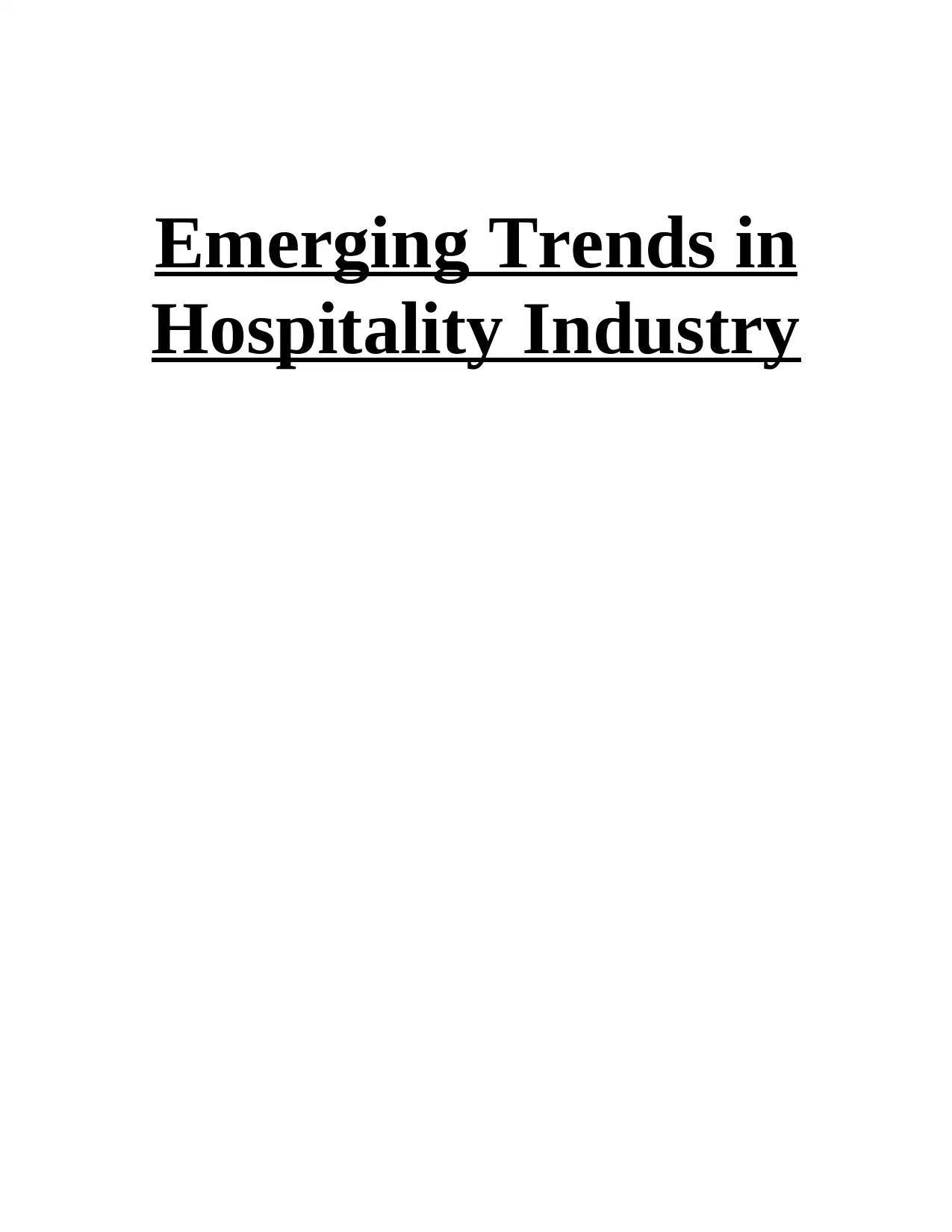
Emerging Trends in
Hospitality Industry
Hospitality Industry
Secure Best Marks with AI Grader
Need help grading? Try our AI Grader for instant feedback on your assignments.
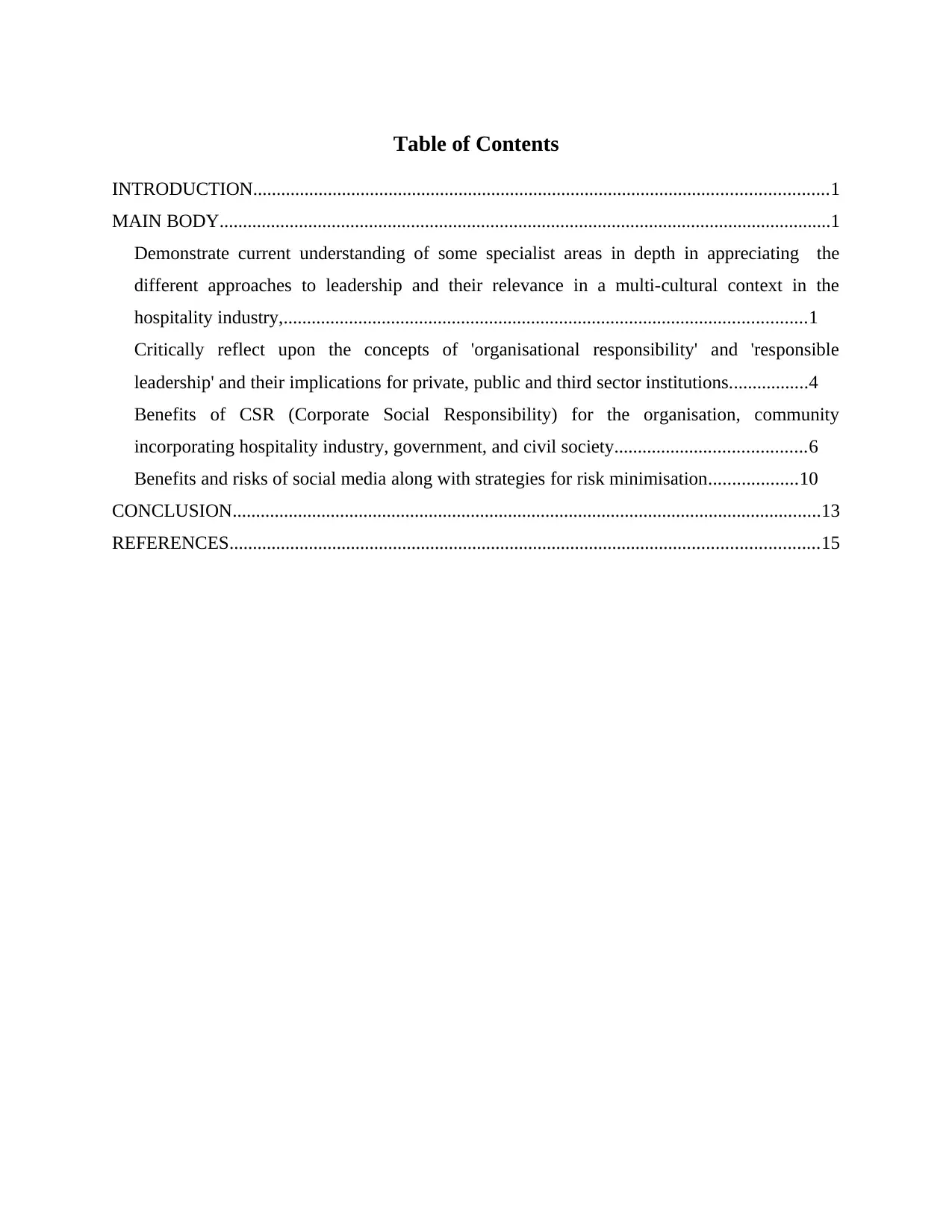
Table of Contents
INTRODUCTION...........................................................................................................................1
MAIN BODY...................................................................................................................................1
Demonstrate current understanding of some specialist areas in depth in appreciating the
different approaches to leadership and their relevance in a multi-cultural context in the
hospitality industry,................................................................................................................1
Critically reflect upon the concepts of 'organisational responsibility' and 'responsible
leadership' and their implications for private, public and third sector institutions.................4
Benefits of CSR (Corporate Social Responsibility) for the organisation, community
incorporating hospitality industry, government, and civil society.........................................6
Benefits and risks of social media along with strategies for risk minimisation...................10
CONCLUSION..............................................................................................................................13
REFERENCES..............................................................................................................................15
INTRODUCTION...........................................................................................................................1
MAIN BODY...................................................................................................................................1
Demonstrate current understanding of some specialist areas in depth in appreciating the
different approaches to leadership and their relevance in a multi-cultural context in the
hospitality industry,................................................................................................................1
Critically reflect upon the concepts of 'organisational responsibility' and 'responsible
leadership' and their implications for private, public and third sector institutions.................4
Benefits of CSR (Corporate Social Responsibility) for the organisation, community
incorporating hospitality industry, government, and civil society.........................................6
Benefits and risks of social media along with strategies for risk minimisation...................10
CONCLUSION..............................................................................................................................13
REFERENCES..............................................................................................................................15
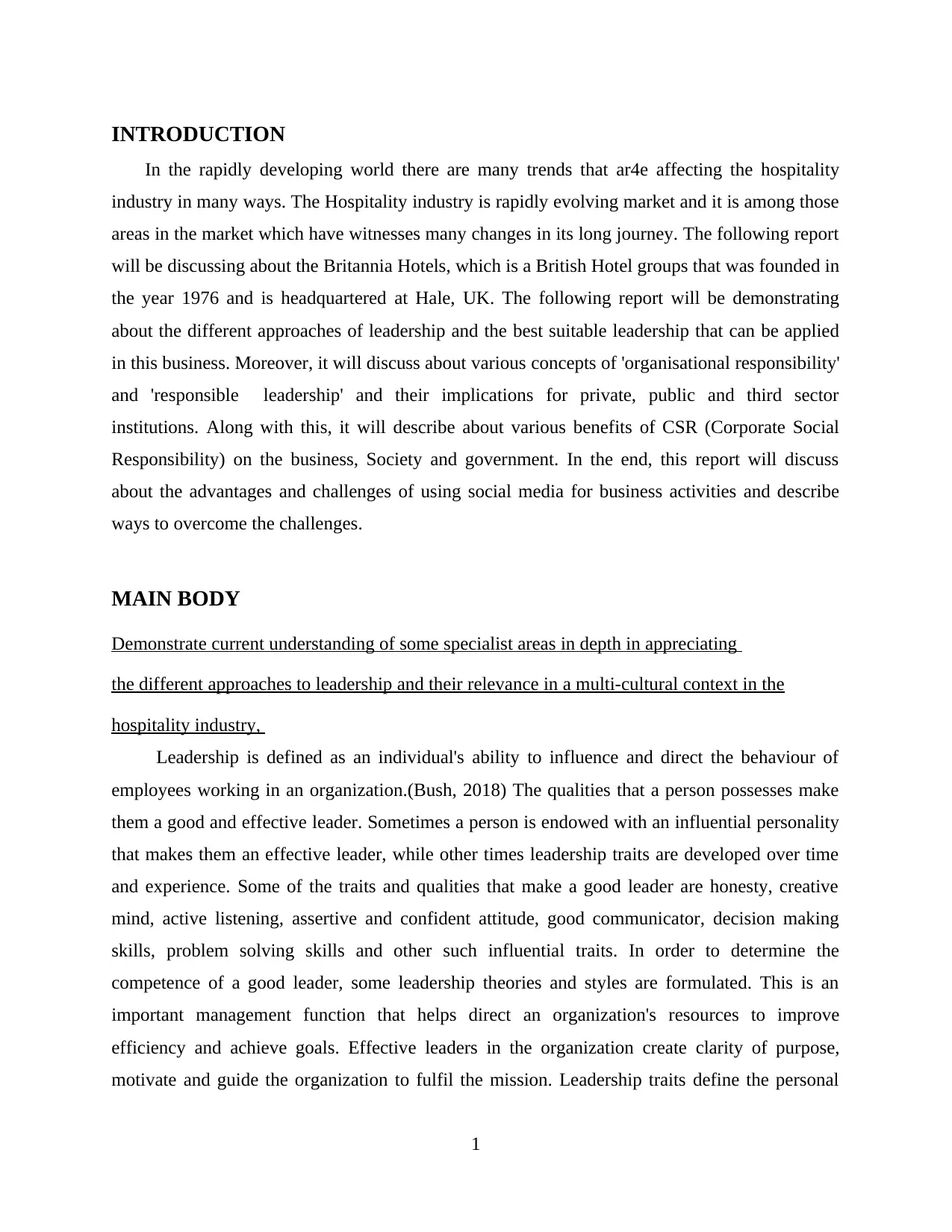
INTRODUCTION
In the rapidly developing world there are many trends that ar4e affecting the hospitality
industry in many ways. The Hospitality industry is rapidly evolving market and it is among those
areas in the market which have witnesses many changes in its long journey. The following report
will be discussing about the Britannia Hotels, which is a British Hotel groups that was founded in
the year 1976 and is headquartered at Hale, UK. The following report will be demonstrating
about the different approaches of leadership and the best suitable leadership that can be applied
in this business. Moreover, it will discuss about various concepts of 'organisational responsibility'
and 'responsible leadership' and their implications for private, public and third sector
institutions. Along with this, it will describe about various benefits of CSR (Corporate Social
Responsibility) on the business, Society and government. In the end, this report will discuss
about the advantages and challenges of using social media for business activities and describe
ways to overcome the challenges.
MAIN BODY
Demonstrate current understanding of some specialist areas in depth in appreciating
the different approaches to leadership and their relevance in a multi-cultural context in the
hospitality industry,
Leadership is defined as an individual's ability to influence and direct the behaviour of
employees working in an organization.(Bush, 2018) The qualities that a person possesses make
them a good and effective leader. Sometimes a person is endowed with an influential personality
that makes them an effective leader, while other times leadership traits are developed over time
and experience. Some of the traits and qualities that make a good leader are honesty, creative
mind, active listening, assertive and confident attitude, good communicator, decision making
skills, problem solving skills and other such influential traits. In order to determine the
competence of a good leader, some leadership theories and styles are formulated. This is an
important management function that helps direct an organization's resources to improve
efficiency and achieve goals. Effective leaders in the organization create clarity of purpose,
motivate and guide the organization to fulfil the mission. Leadership traits define the personal
1
In the rapidly developing world there are many trends that ar4e affecting the hospitality
industry in many ways. The Hospitality industry is rapidly evolving market and it is among those
areas in the market which have witnesses many changes in its long journey. The following report
will be discussing about the Britannia Hotels, which is a British Hotel groups that was founded in
the year 1976 and is headquartered at Hale, UK. The following report will be demonstrating
about the different approaches of leadership and the best suitable leadership that can be applied
in this business. Moreover, it will discuss about various concepts of 'organisational responsibility'
and 'responsible leadership' and their implications for private, public and third sector
institutions. Along with this, it will describe about various benefits of CSR (Corporate Social
Responsibility) on the business, Society and government. In the end, this report will discuss
about the advantages and challenges of using social media for business activities and describe
ways to overcome the challenges.
MAIN BODY
Demonstrate current understanding of some specialist areas in depth in appreciating
the different approaches to leadership and their relevance in a multi-cultural context in the
hospitality industry,
Leadership is defined as an individual's ability to influence and direct the behaviour of
employees working in an organization.(Bush, 2018) The qualities that a person possesses make
them a good and effective leader. Sometimes a person is endowed with an influential personality
that makes them an effective leader, while other times leadership traits are developed over time
and experience. Some of the traits and qualities that make a good leader are honesty, creative
mind, active listening, assertive and confident attitude, good communicator, decision making
skills, problem solving skills and other such influential traits. In order to determine the
competence of a good leader, some leadership theories and styles are formulated. This is an
important management function that helps direct an organization's resources to improve
efficiency and achieve goals. Effective leaders in the organization create clarity of purpose,
motivate and guide the organization to fulfil the mission. Leadership traits define the personal
1
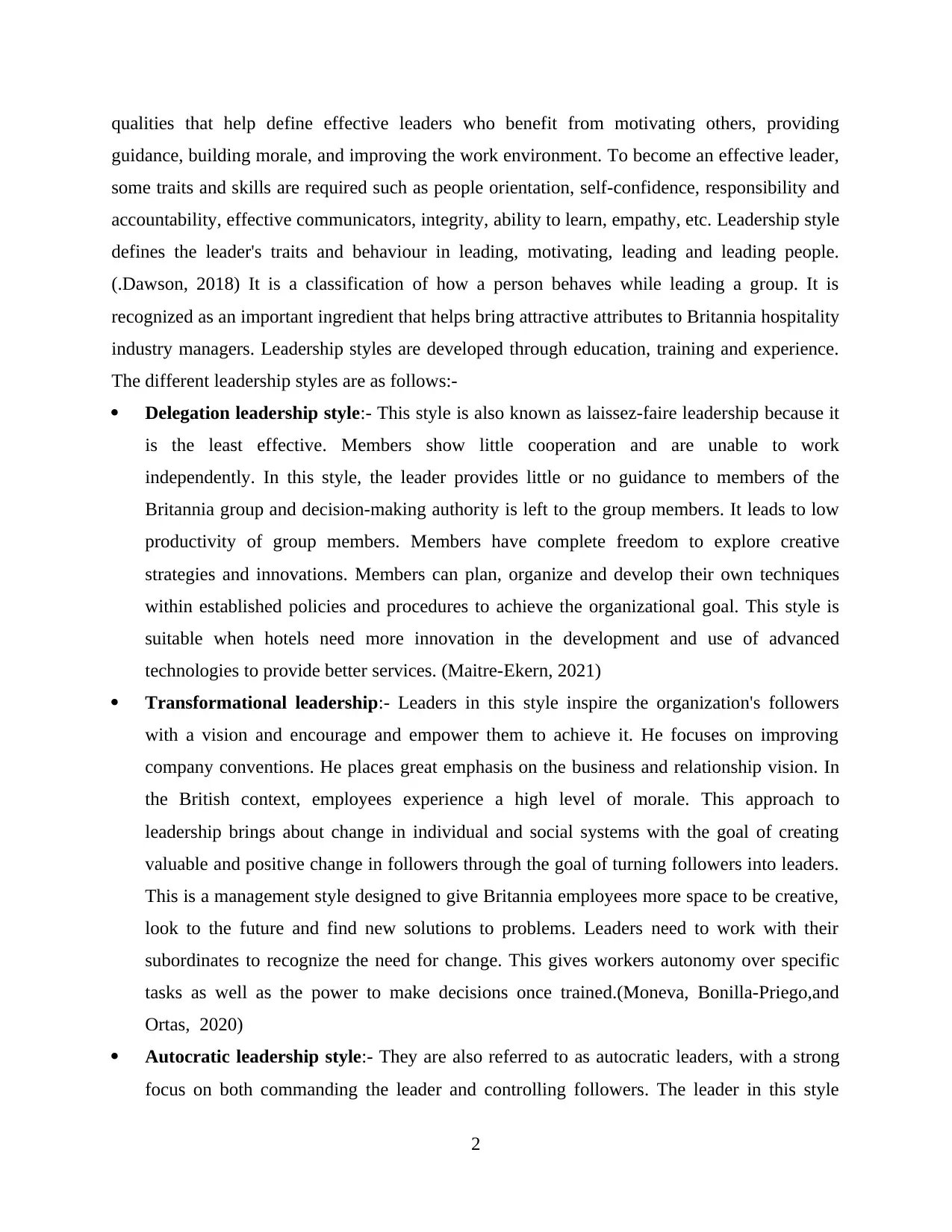
qualities that help define effective leaders who benefit from motivating others, providing
guidance, building morale, and improving the work environment. To become an effective leader,
some traits and skills are required such as people orientation, self-confidence, responsibility and
accountability, effective communicators, integrity, ability to learn, empathy, etc. Leadership style
defines the leader's traits and behaviour in leading, motivating, leading and leading people.
(.Dawson, 2018) It is a classification of how a person behaves while leading a group. It is
recognized as an important ingredient that helps bring attractive attributes to Britannia hospitality
industry managers. Leadership styles are developed through education, training and experience.
The different leadership styles are as follows:-
Delegation leadership style:- This style is also known as laissez-faire leadership because it
is the least effective. Members show little cooperation and are unable to work
independently. In this style, the leader provides little or no guidance to members of the
Britannia group and decision-making authority is left to the group members. It leads to low
productivity of group members. Members have complete freedom to explore creative
strategies and innovations. Members can plan, organize and develop their own techniques
within established policies and procedures to achieve the organizational goal. This style is
suitable when hotels need more innovation in the development and use of advanced
technologies to provide better services. (Maitre-Ekern, 2021)
Transformational leadership:- Leaders in this style inspire the organization's followers
with a vision and encourage and empower them to achieve it. He focuses on improving
company conventions. He places great emphasis on the business and relationship vision. In
the British context, employees experience a high level of morale. This approach to
leadership brings about change in individual and social systems with the goal of creating
valuable and positive change in followers through the goal of turning followers into leaders.
This is a management style designed to give Britannia employees more space to be creative,
look to the future and find new solutions to problems. Leaders need to work with their
subordinates to recognize the need for change. This gives workers autonomy over specific
tasks as well as the power to make decisions once trained.(Moneva, Bonilla-Priego,and
Ortas, 2020)
Autocratic leadership style:- They are also referred to as autocratic leaders, with a strong
focus on both commanding the leader and controlling followers. The leader in this style
2
guidance, building morale, and improving the work environment. To become an effective leader,
some traits and skills are required such as people orientation, self-confidence, responsibility and
accountability, effective communicators, integrity, ability to learn, empathy, etc. Leadership style
defines the leader's traits and behaviour in leading, motivating, leading and leading people.
(.Dawson, 2018) It is a classification of how a person behaves while leading a group. It is
recognized as an important ingredient that helps bring attractive attributes to Britannia hospitality
industry managers. Leadership styles are developed through education, training and experience.
The different leadership styles are as follows:-
Delegation leadership style:- This style is also known as laissez-faire leadership because it
is the least effective. Members show little cooperation and are unable to work
independently. In this style, the leader provides little or no guidance to members of the
Britannia group and decision-making authority is left to the group members. It leads to low
productivity of group members. Members have complete freedom to explore creative
strategies and innovations. Members can plan, organize and develop their own techniques
within established policies and procedures to achieve the organizational goal. This style is
suitable when hotels need more innovation in the development and use of advanced
technologies to provide better services. (Maitre-Ekern, 2021)
Transformational leadership:- Leaders in this style inspire the organization's followers
with a vision and encourage and empower them to achieve it. He focuses on improving
company conventions. He places great emphasis on the business and relationship vision. In
the British context, employees experience a high level of morale. This approach to
leadership brings about change in individual and social systems with the goal of creating
valuable and positive change in followers through the goal of turning followers into leaders.
This is a management style designed to give Britannia employees more space to be creative,
look to the future and find new solutions to problems. Leaders need to work with their
subordinates to recognize the need for change. This gives workers autonomy over specific
tasks as well as the power to make decisions once trained.(Moneva, Bonilla-Priego,and
Ortas, 2020)
Autocratic leadership style:- They are also referred to as autocratic leaders, with a strong
focus on both commanding the leader and controlling followers. The leader in this style
2
Secure Best Marks with AI Grader
Need help grading? Try our AI Grader for instant feedback on your assignments.
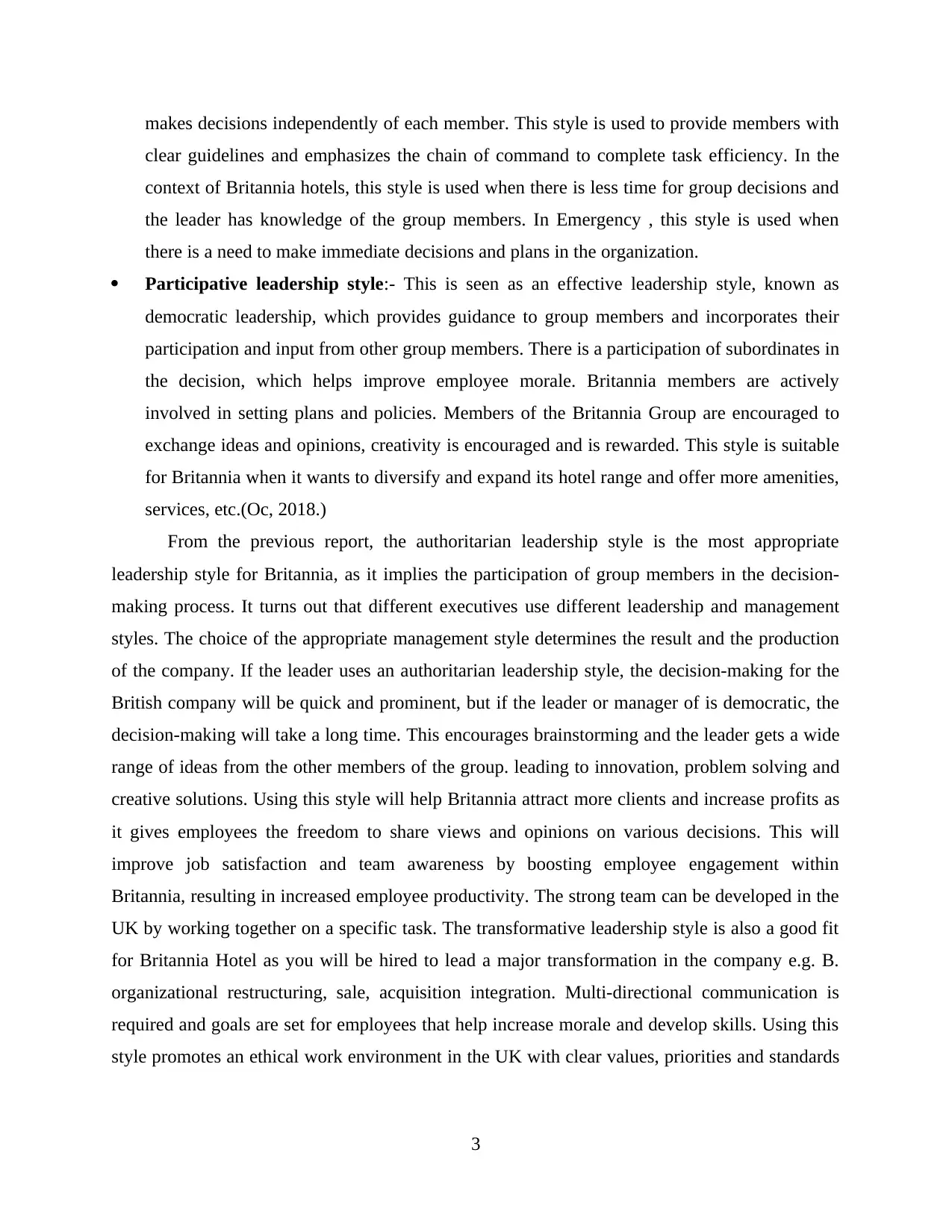
makes decisions independently of each member. This style is used to provide members with
clear guidelines and emphasizes the chain of command to complete task efficiency. In the
context of Britannia hotels, this style is used when there is less time for group decisions and
the leader has knowledge of the group members. In Emergency , this style is used when
there is a need to make immediate decisions and plans in the organization.
Participative leadership style:- This is seen as an effective leadership style, known as
democratic leadership, which provides guidance to group members and incorporates their
participation and input from other group members. There is a participation of subordinates in
the decision, which helps improve employee morale. Britannia members are actively
involved in setting plans and policies. Members of the Britannia Group are encouraged to
exchange ideas and opinions, creativity is encouraged and is rewarded. This style is suitable
for Britannia when it wants to diversify and expand its hotel range and offer more amenities,
services, etc.(Oc, 2018.)
From the previous report, the authoritarian leadership style is the most appropriate
leadership style for Britannia, as it implies the participation of group members in the decision-
making process. It turns out that different executives use different leadership and management
styles. The choice of the appropriate management style determines the result and the production
of the company. If the leader uses an authoritarian leadership style, the decision-making for the
British company will be quick and prominent, but if the leader or manager of is democratic, the
decision-making will take a long time. This encourages brainstorming and the leader gets a wide
range of ideas from the other members of the group. leading to innovation, problem solving and
creative solutions. Using this style will help Britannia attract more clients and increase profits as
it gives employees the freedom to share views and opinions on various decisions. This will
improve job satisfaction and team awareness by boosting employee engagement within
Britannia, resulting in increased employee productivity. The strong team can be developed in the
UK by working together on a specific task. The transformative leadership style is also a good fit
for Britannia Hotel as you will be hired to lead a major transformation in the company e.g. B.
organizational restructuring, sale, acquisition integration. Multi-directional communication is
required and goals are set for employees that help increase morale and develop skills. Using this
style promotes an ethical work environment in the UK with clear values, priorities and standards
3
clear guidelines and emphasizes the chain of command to complete task efficiency. In the
context of Britannia hotels, this style is used when there is less time for group decisions and
the leader has knowledge of the group members. In Emergency , this style is used when
there is a need to make immediate decisions and plans in the organization.
Participative leadership style:- This is seen as an effective leadership style, known as
democratic leadership, which provides guidance to group members and incorporates their
participation and input from other group members. There is a participation of subordinates in
the decision, which helps improve employee morale. Britannia members are actively
involved in setting plans and policies. Members of the Britannia Group are encouraged to
exchange ideas and opinions, creativity is encouraged and is rewarded. This style is suitable
for Britannia when it wants to diversify and expand its hotel range and offer more amenities,
services, etc.(Oc, 2018.)
From the previous report, the authoritarian leadership style is the most appropriate
leadership style for Britannia, as it implies the participation of group members in the decision-
making process. It turns out that different executives use different leadership and management
styles. The choice of the appropriate management style determines the result and the production
of the company. If the leader uses an authoritarian leadership style, the decision-making for the
British company will be quick and prominent, but if the leader or manager of is democratic, the
decision-making will take a long time. This encourages brainstorming and the leader gets a wide
range of ideas from the other members of the group. leading to innovation, problem solving and
creative solutions. Using this style will help Britannia attract more clients and increase profits as
it gives employees the freedom to share views and opinions on various decisions. This will
improve job satisfaction and team awareness by boosting employee engagement within
Britannia, resulting in increased employee productivity. The strong team can be developed in the
UK by working together on a specific task. The transformative leadership style is also a good fit
for Britannia Hotel as you will be hired to lead a major transformation in the company e.g. B.
organizational restructuring, sale, acquisition integration. Multi-directional communication is
required and goals are set for employees that help increase morale and develop skills. Using this
style promotes an ethical work environment in the UK with clear values, priorities and standards
3
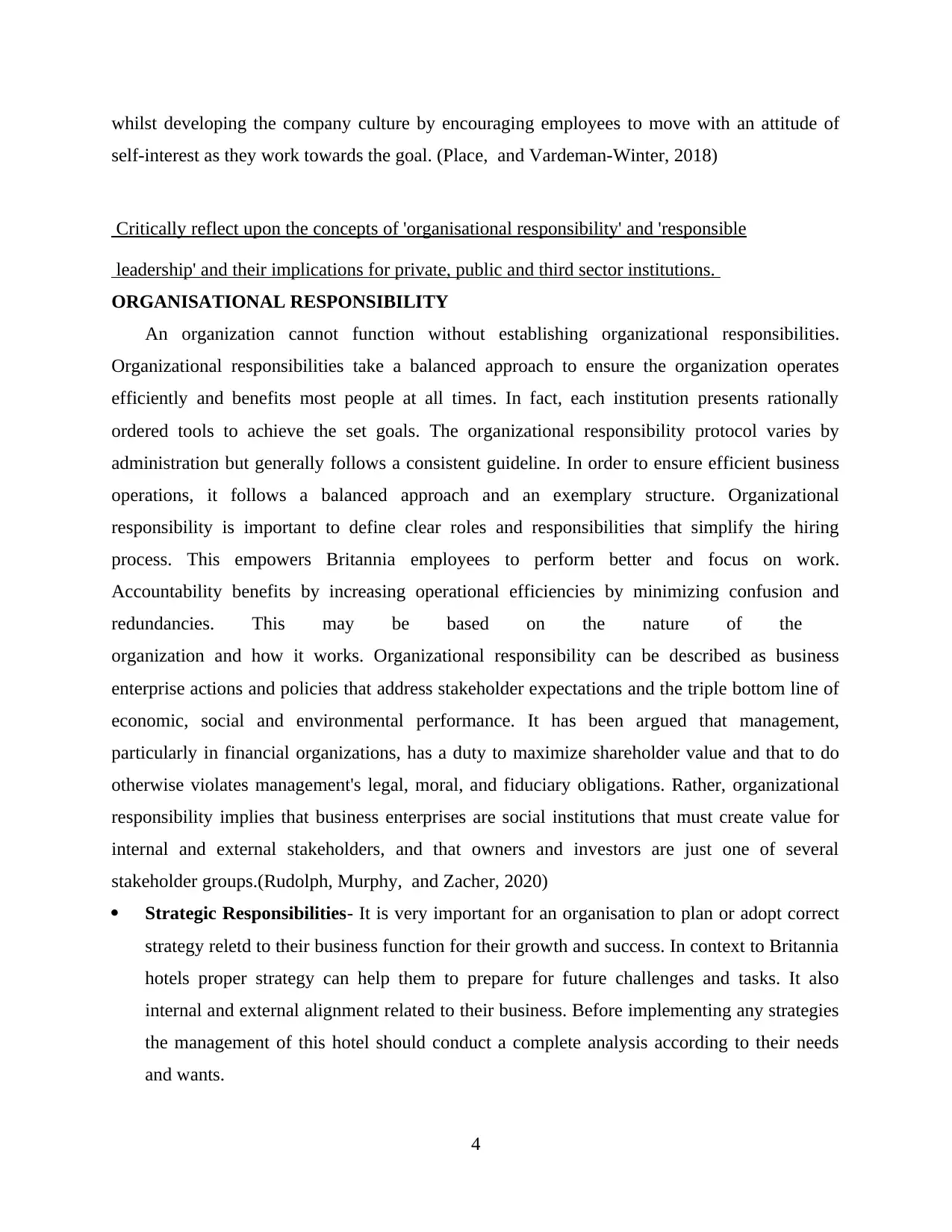
whilst developing the company culture by encouraging employees to move with an attitude of
self-interest as they work towards the goal. (Place, and Vardeman-Winter, 2018)
Critically reflect upon the concepts of 'organisational responsibility' and 'responsible
leadership' and their implications for private, public and third sector institutions.
ORGANISATIONAL RESPONSIBILITY
An organization cannot function without establishing organizational responsibilities.
Organizational responsibilities take a balanced approach to ensure the organization operates
efficiently and benefits most people at all times. In fact, each institution presents rationally
ordered tools to achieve the set goals. The organizational responsibility protocol varies by
administration but generally follows a consistent guideline. In order to ensure efficient business
operations, it follows a balanced approach and an exemplary structure. Organizational
responsibility is important to define clear roles and responsibilities that simplify the hiring
process. This empowers Britannia employees to perform better and focus on work.
Accountability benefits by increasing operational efficiencies by minimizing confusion and
redundancies. This may be based on the nature of the
organization and how it works. Organizational responsibility can be described as business
enterprise actions and policies that address stakeholder expectations and the triple bottom line of
economic, social and environmental performance. It has been argued that management,
particularly in financial organizations, has a duty to maximize shareholder value and that to do
otherwise violates management's legal, moral, and fiduciary obligations. Rather, organizational
responsibility implies that business enterprises are social institutions that must create value for
internal and external stakeholders, and that owners and investors are just one of several
stakeholder groups.(Rudolph, Murphy, and Zacher, 2020)
Strategic Responsibilities- It is very important for an organisation to plan or adopt correct
strategy reletd to their business function for their growth and success. In context to Britannia
hotels proper strategy can help them to prepare for future challenges and tasks. It also
internal and external alignment related to their business. Before implementing any strategies
the management of this hotel should conduct a complete analysis according to their needs
and wants.
4
self-interest as they work towards the goal. (Place, and Vardeman-Winter, 2018)
Critically reflect upon the concepts of 'organisational responsibility' and 'responsible
leadership' and their implications for private, public and third sector institutions.
ORGANISATIONAL RESPONSIBILITY
An organization cannot function without establishing organizational responsibilities.
Organizational responsibilities take a balanced approach to ensure the organization operates
efficiently and benefits most people at all times. In fact, each institution presents rationally
ordered tools to achieve the set goals. The organizational responsibility protocol varies by
administration but generally follows a consistent guideline. In order to ensure efficient business
operations, it follows a balanced approach and an exemplary structure. Organizational
responsibility is important to define clear roles and responsibilities that simplify the hiring
process. This empowers Britannia employees to perform better and focus on work.
Accountability benefits by increasing operational efficiencies by minimizing confusion and
redundancies. This may be based on the nature of the
organization and how it works. Organizational responsibility can be described as business
enterprise actions and policies that address stakeholder expectations and the triple bottom line of
economic, social and environmental performance. It has been argued that management,
particularly in financial organizations, has a duty to maximize shareholder value and that to do
otherwise violates management's legal, moral, and fiduciary obligations. Rather, organizational
responsibility implies that business enterprises are social institutions that must create value for
internal and external stakeholders, and that owners and investors are just one of several
stakeholder groups.(Rudolph, Murphy, and Zacher, 2020)
Strategic Responsibilities- It is very important for an organisation to plan or adopt correct
strategy reletd to their business function for their growth and success. In context to Britannia
hotels proper strategy can help them to prepare for future challenges and tasks. It also
internal and external alignment related to their business. Before implementing any strategies
the management of this hotel should conduct a complete analysis according to their needs
and wants.
4
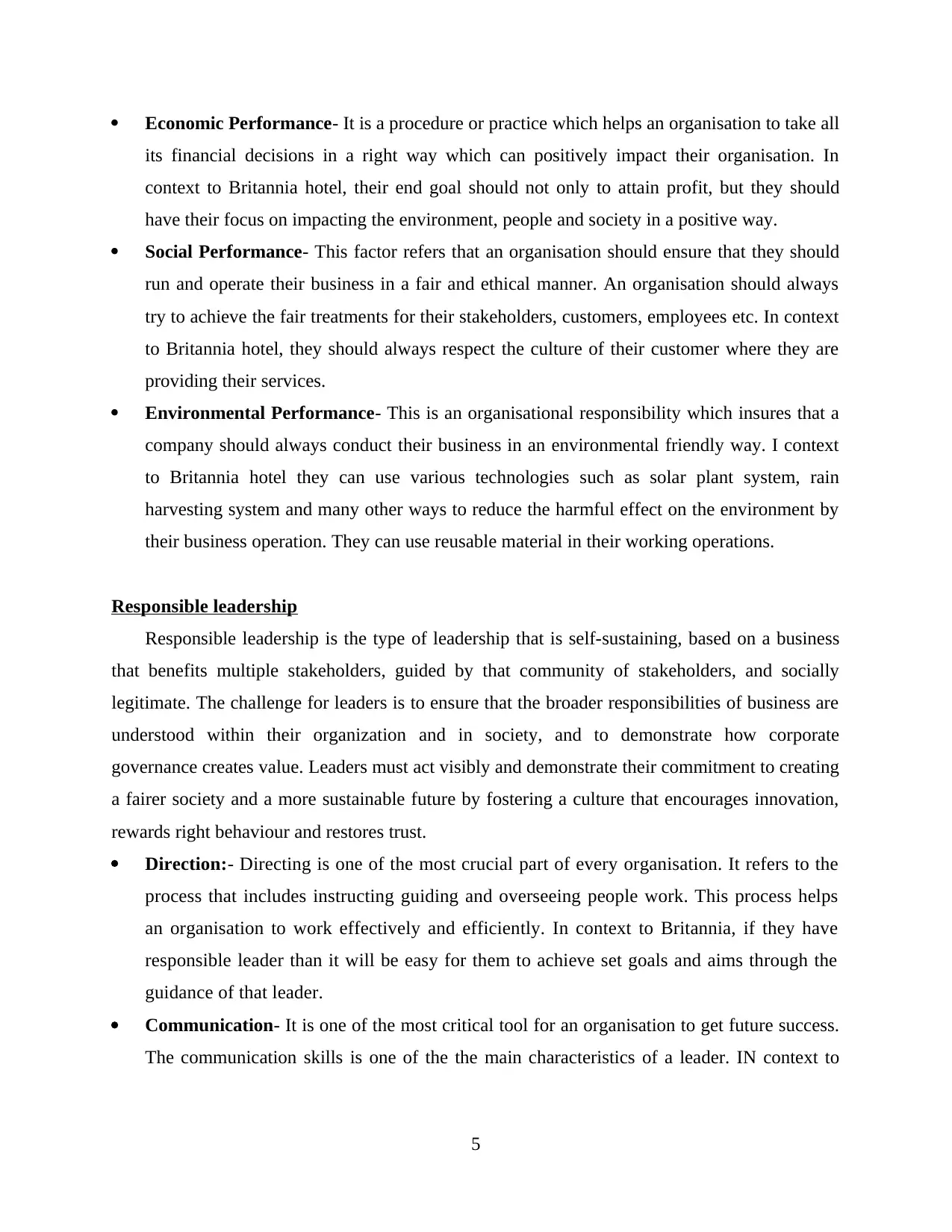
Economic Performance- It is a procedure or practice which helps an organisation to take all
its financial decisions in a right way which can positively impact their organisation. In
context to Britannia hotel, their end goal should not only to attain profit, but they should
have their focus on impacting the environment, people and society in a positive way.
Social Performance- This factor refers that an organisation should ensure that they should
run and operate their business in a fair and ethical manner. An organisation should always
try to achieve the fair treatments for their stakeholders, customers, employees etc. In context
to Britannia hotel, they should always respect the culture of their customer where they are
providing their services.
Environmental Performance- This is an organisational responsibility which insures that a
company should always conduct their business in an environmental friendly way. I context
to Britannia hotel they can use various technologies such as solar plant system, rain
harvesting system and many other ways to reduce the harmful effect on the environment by
their business operation. They can use reusable material in their working operations.
Responsible leadership
Responsible leadership is the type of leadership that is self-sustaining, based on a business
that benefits multiple stakeholders, guided by that community of stakeholders, and socially
legitimate. The challenge for leaders is to ensure that the broader responsibilities of business are
understood within their organization and in society, and to demonstrate how corporate
governance creates value. Leaders must act visibly and demonstrate their commitment to creating
a fairer society and a more sustainable future by fostering a culture that encourages innovation,
rewards right behaviour and restores trust.
Direction:- Directing is one of the most crucial part of every organisation. It refers to the
process that includes instructing guiding and overseeing people work. This process helps
an organisation to work effectively and efficiently. In context to Britannia, if they have
responsible leader than it will be easy for them to achieve set goals and aims through the
guidance of that leader.
Communication- It is one of the most critical tool for an organisation to get future success.
The communication skills is one of the the main characteristics of a leader. IN context to
5
its financial decisions in a right way which can positively impact their organisation. In
context to Britannia hotel, their end goal should not only to attain profit, but they should
have their focus on impacting the environment, people and society in a positive way.
Social Performance- This factor refers that an organisation should ensure that they should
run and operate their business in a fair and ethical manner. An organisation should always
try to achieve the fair treatments for their stakeholders, customers, employees etc. In context
to Britannia hotel, they should always respect the culture of their customer where they are
providing their services.
Environmental Performance- This is an organisational responsibility which insures that a
company should always conduct their business in an environmental friendly way. I context
to Britannia hotel they can use various technologies such as solar plant system, rain
harvesting system and many other ways to reduce the harmful effect on the environment by
their business operation. They can use reusable material in their working operations.
Responsible leadership
Responsible leadership is the type of leadership that is self-sustaining, based on a business
that benefits multiple stakeholders, guided by that community of stakeholders, and socially
legitimate. The challenge for leaders is to ensure that the broader responsibilities of business are
understood within their organization and in society, and to demonstrate how corporate
governance creates value. Leaders must act visibly and demonstrate their commitment to creating
a fairer society and a more sustainable future by fostering a culture that encourages innovation,
rewards right behaviour and restores trust.
Direction:- Directing is one of the most crucial part of every organisation. It refers to the
process that includes instructing guiding and overseeing people work. This process helps
an organisation to work effectively and efficiently. In context to Britannia, if they have
responsible leader than it will be easy for them to achieve set goals and aims through the
guidance of that leader.
Communication- It is one of the most critical tool for an organisation to get future success.
The communication skills is one of the the main characteristics of a leader. IN context to
5
Paraphrase This Document
Need a fresh take? Get an instant paraphrase of this document with our AI Paraphraser
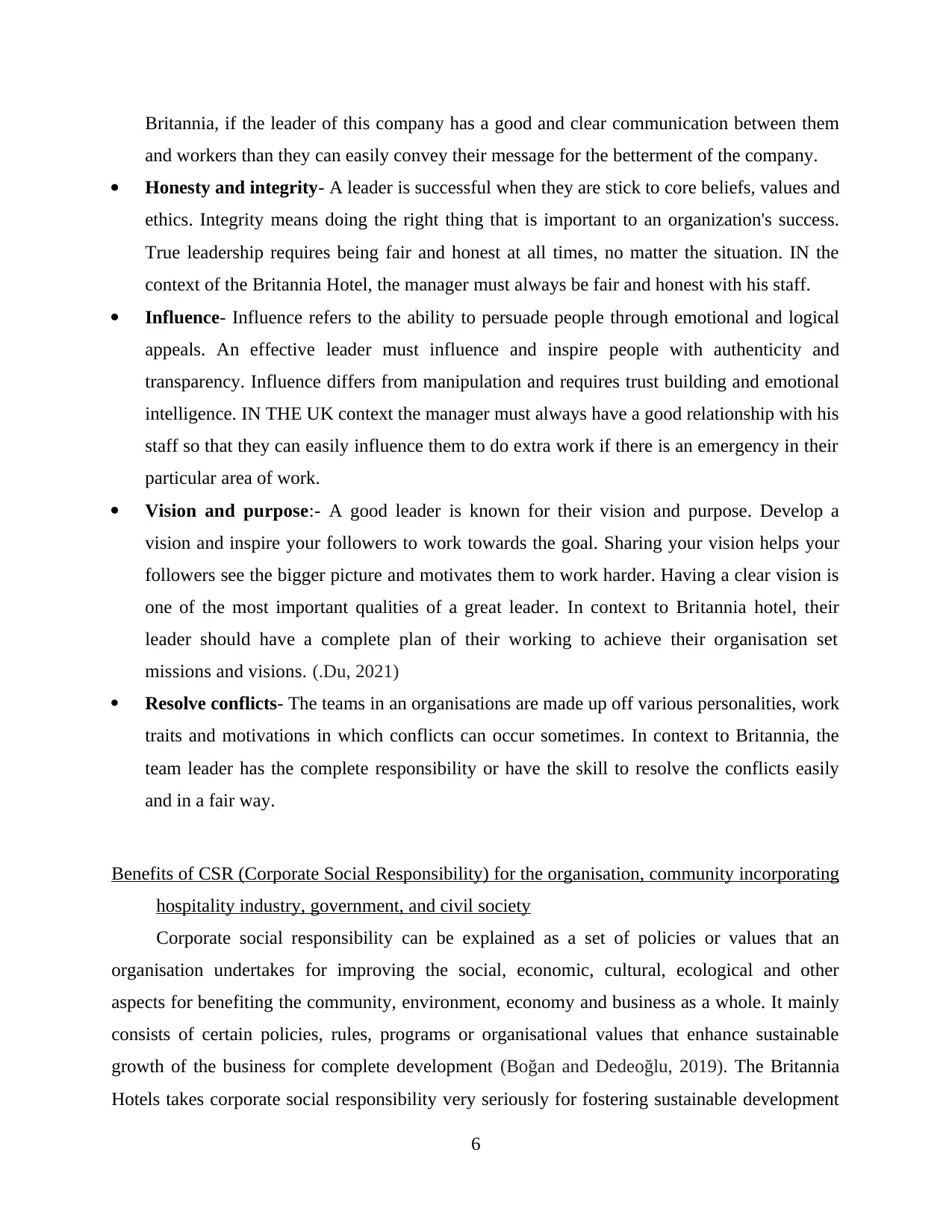
Britannia, if the leader of this company has a good and clear communication between them
and workers than they can easily convey their message for the betterment of the company.
Honesty and integrity- A leader is successful when they are stick to core beliefs, values and
ethics. Integrity means doing the right thing that is important to an organization's success.
True leadership requires being fair and honest at all times, no matter the situation. IN the
context of the Britannia Hotel, the manager must always be fair and honest with his staff.
Influence- Influence refers to the ability to persuade people through emotional and logical
appeals. An effective leader must influence and inspire people with authenticity and
transparency. Influence differs from manipulation and requires trust building and emotional
intelligence. IN THE UK context the manager must always have a good relationship with his
staff so that they can easily influence them to do extra work if there is an emergency in their
particular area of work.
Vision and purpose:- A good leader is known for their vision and purpose. Develop a
vision and inspire your followers to work towards the goal. Sharing your vision helps your
followers see the bigger picture and motivates them to work harder. Having a clear vision is
one of the most important qualities of a great leader. In context to Britannia hotel, their
leader should have a complete plan of their working to achieve their organisation set
missions and visions. (.Du, 2021)
Resolve conflicts- The teams in an organisations are made up off various personalities, work
traits and motivations in which conflicts can occur sometimes. In context to Britannia, the
team leader has the complete responsibility or have the skill to resolve the conflicts easily
and in a fair way.
Benefits of CSR (Corporate Social Responsibility) for the organisation, community incorporating
hospitality industry, government, and civil society
Corporate social responsibility can be explained as a set of policies or values that an
organisation undertakes for improving the social, economic, cultural, ecological and other
aspects for benefiting the community, environment, economy and business as a whole. It mainly
consists of certain policies, rules, programs or organisational values that enhance sustainable
growth of the business for complete development (Boğan and Dedeoğlu, 2019). The Britannia
Hotels takes corporate social responsibility very seriously for fostering sustainable development
6
and workers than they can easily convey their message for the betterment of the company.
Honesty and integrity- A leader is successful when they are stick to core beliefs, values and
ethics. Integrity means doing the right thing that is important to an organization's success.
True leadership requires being fair and honest at all times, no matter the situation. IN the
context of the Britannia Hotel, the manager must always be fair and honest with his staff.
Influence- Influence refers to the ability to persuade people through emotional and logical
appeals. An effective leader must influence and inspire people with authenticity and
transparency. Influence differs from manipulation and requires trust building and emotional
intelligence. IN THE UK context the manager must always have a good relationship with his
staff so that they can easily influence them to do extra work if there is an emergency in their
particular area of work.
Vision and purpose:- A good leader is known for their vision and purpose. Develop a
vision and inspire your followers to work towards the goal. Sharing your vision helps your
followers see the bigger picture and motivates them to work harder. Having a clear vision is
one of the most important qualities of a great leader. In context to Britannia hotel, their
leader should have a complete plan of their working to achieve their organisation set
missions and visions. (.Du, 2021)
Resolve conflicts- The teams in an organisations are made up off various personalities, work
traits and motivations in which conflicts can occur sometimes. In context to Britannia, the
team leader has the complete responsibility or have the skill to resolve the conflicts easily
and in a fair way.
Benefits of CSR (Corporate Social Responsibility) for the organisation, community incorporating
hospitality industry, government, and civil society
Corporate social responsibility can be explained as a set of policies or values that an
organisation undertakes for improving the social, economic, cultural, ecological and other
aspects for benefiting the community, environment, economy and business as a whole. It mainly
consists of certain policies, rules, programs or organisational values that enhance sustainable
growth of the business for complete development (Boğan and Dedeoğlu, 2019). The Britannia
Hotels takes corporate social responsibility very seriously for fostering sustainable development
6
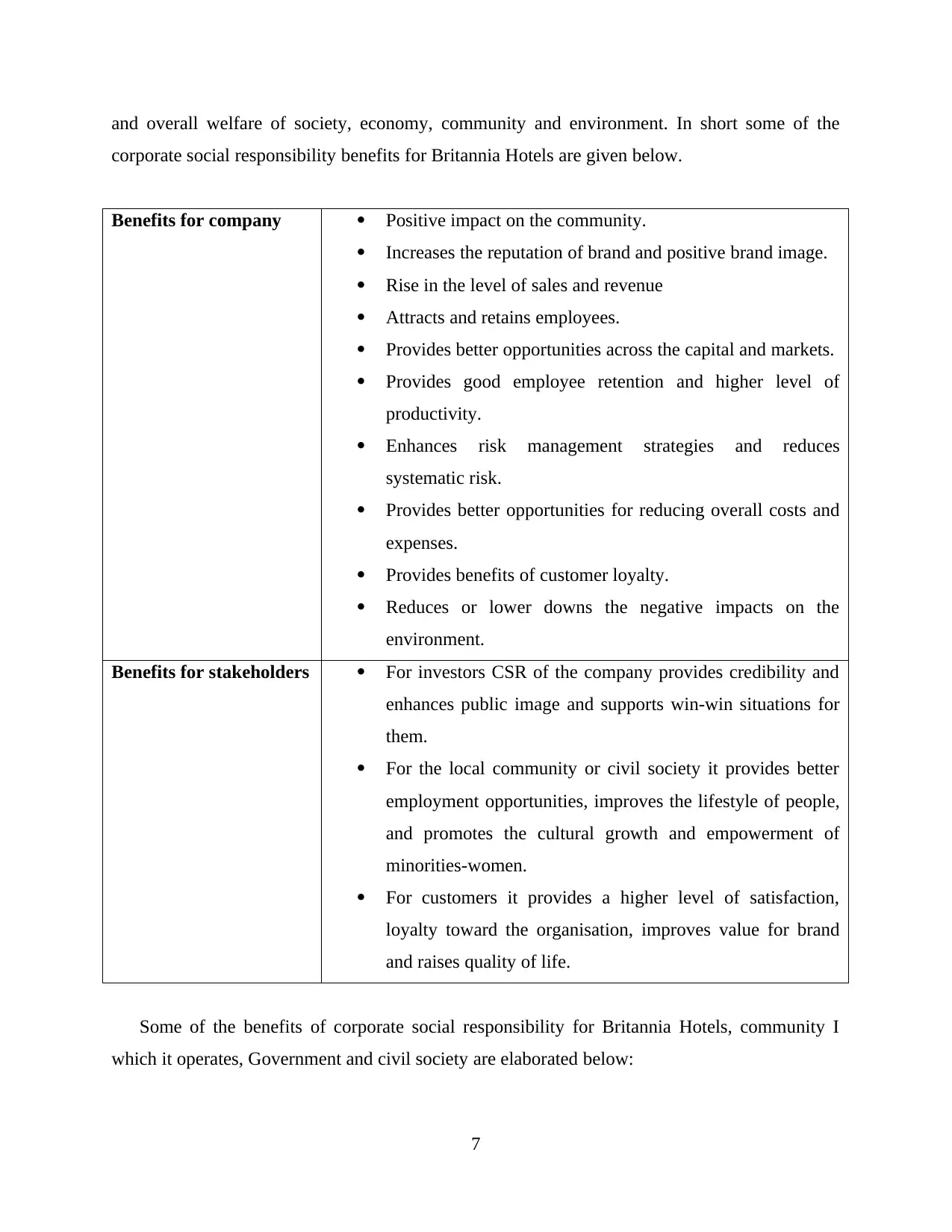
and overall welfare of society, economy, community and environment. In short some of the
corporate social responsibility benefits for Britannia Hotels are given below.
Benefits for company Positive impact on the community.
Increases the reputation of brand and positive brand image.
Rise in the level of sales and revenue
Attracts and retains employees.
Provides better opportunities across the capital and markets.
Provides good employee retention and higher level of
productivity.
Enhances risk management strategies and reduces
systematic risk.
Provides better opportunities for reducing overall costs and
expenses.
Provides benefits of customer loyalty.
Reduces or lower downs the negative impacts on the
environment.
Benefits for stakeholders For investors CSR of the company provides credibility and
enhances public image and supports win-win situations for
them.
For the local community or civil society it provides better
employment opportunities, improves the lifestyle of people,
and promotes the cultural growth and empowerment of
minorities-women.
For customers it provides a higher level of satisfaction,
loyalty toward the organisation, improves value for brand
and raises quality of life.
Some of the benefits of corporate social responsibility for Britannia Hotels, community I
which it operates, Government and civil society are elaborated below:
7
corporate social responsibility benefits for Britannia Hotels are given below.
Benefits for company Positive impact on the community.
Increases the reputation of brand and positive brand image.
Rise in the level of sales and revenue
Attracts and retains employees.
Provides better opportunities across the capital and markets.
Provides good employee retention and higher level of
productivity.
Enhances risk management strategies and reduces
systematic risk.
Provides better opportunities for reducing overall costs and
expenses.
Provides benefits of customer loyalty.
Reduces or lower downs the negative impacts on the
environment.
Benefits for stakeholders For investors CSR of the company provides credibility and
enhances public image and supports win-win situations for
them.
For the local community or civil society it provides better
employment opportunities, improves the lifestyle of people,
and promotes the cultural growth and empowerment of
minorities-women.
For customers it provides a higher level of satisfaction,
loyalty toward the organisation, improves value for brand
and raises quality of life.
Some of the benefits of corporate social responsibility for Britannia Hotels, community I
which it operates, Government and civil society are elaborated below:
7
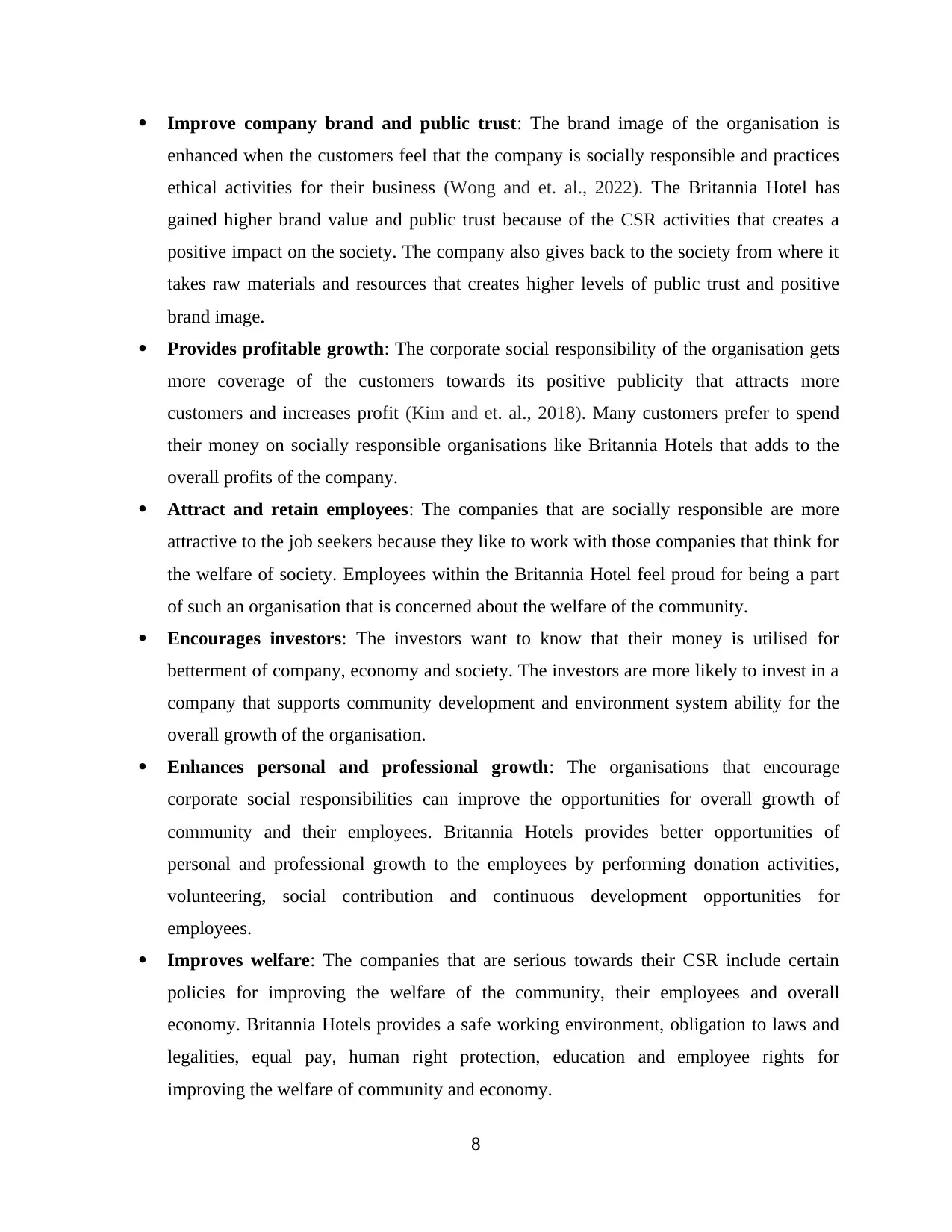
Improve company brand and public trust: The brand image of the organisation is
enhanced when the customers feel that the company is socially responsible and practices
ethical activities for their business (Wong and et. al., 2022). The Britannia Hotel has
gained higher brand value and public trust because of the CSR activities that creates a
positive impact on the society. The company also gives back to the society from where it
takes raw materials and resources that creates higher levels of public trust and positive
brand image.
Provides profitable growth: The corporate social responsibility of the organisation gets
more coverage of the customers towards its positive publicity that attracts more
customers and increases profit (Kim and et. al., 2018). Many customers prefer to spend
their money on socially responsible organisations like Britannia Hotels that adds to the
overall profits of the company.
Attract and retain employees: The companies that are socially responsible are more
attractive to the job seekers because they like to work with those companies that think for
the welfare of society. Employees within the Britannia Hotel feel proud for being a part
of such an organisation that is concerned about the welfare of the community.
Encourages investors: The investors want to know that their money is utilised for
betterment of company, economy and society. The investors are more likely to invest in a
company that supports community development and environment system ability for the
overall growth of the organisation.
Enhances personal and professional growth: The organisations that encourage
corporate social responsibilities can improve the opportunities for overall growth of
community and their employees. Britannia Hotels provides better opportunities of
personal and professional growth to the employees by performing donation activities,
volunteering, social contribution and continuous development opportunities for
employees.
Improves welfare: The companies that are serious towards their CSR include certain
policies for improving the welfare of the community, their employees and overall
economy. Britannia Hotels provides a safe working environment, obligation to laws and
legalities, equal pay, human right protection, education and employee rights for
improving the welfare of community and economy.
8
enhanced when the customers feel that the company is socially responsible and practices
ethical activities for their business (Wong and et. al., 2022). The Britannia Hotel has
gained higher brand value and public trust because of the CSR activities that creates a
positive impact on the society. The company also gives back to the society from where it
takes raw materials and resources that creates higher levels of public trust and positive
brand image.
Provides profitable growth: The corporate social responsibility of the organisation gets
more coverage of the customers towards its positive publicity that attracts more
customers and increases profit (Kim and et. al., 2018). Many customers prefer to spend
their money on socially responsible organisations like Britannia Hotels that adds to the
overall profits of the company.
Attract and retain employees: The companies that are socially responsible are more
attractive to the job seekers because they like to work with those companies that think for
the welfare of society. Employees within the Britannia Hotel feel proud for being a part
of such an organisation that is concerned about the welfare of the community.
Encourages investors: The investors want to know that their money is utilised for
betterment of company, economy and society. The investors are more likely to invest in a
company that supports community development and environment system ability for the
overall growth of the organisation.
Enhances personal and professional growth: The organisations that encourage
corporate social responsibilities can improve the opportunities for overall growth of
community and their employees. Britannia Hotels provides better opportunities of
personal and professional growth to the employees by performing donation activities,
volunteering, social contribution and continuous development opportunities for
employees.
Improves welfare: The companies that are serious towards their CSR include certain
policies for improving the welfare of the community, their employees and overall
economy. Britannia Hotels provides a safe working environment, obligation to laws and
legalities, equal pay, human right protection, education and employee rights for
improving the welfare of community and economy.
8
Secure Best Marks with AI Grader
Need help grading? Try our AI Grader for instant feedback on your assignments.
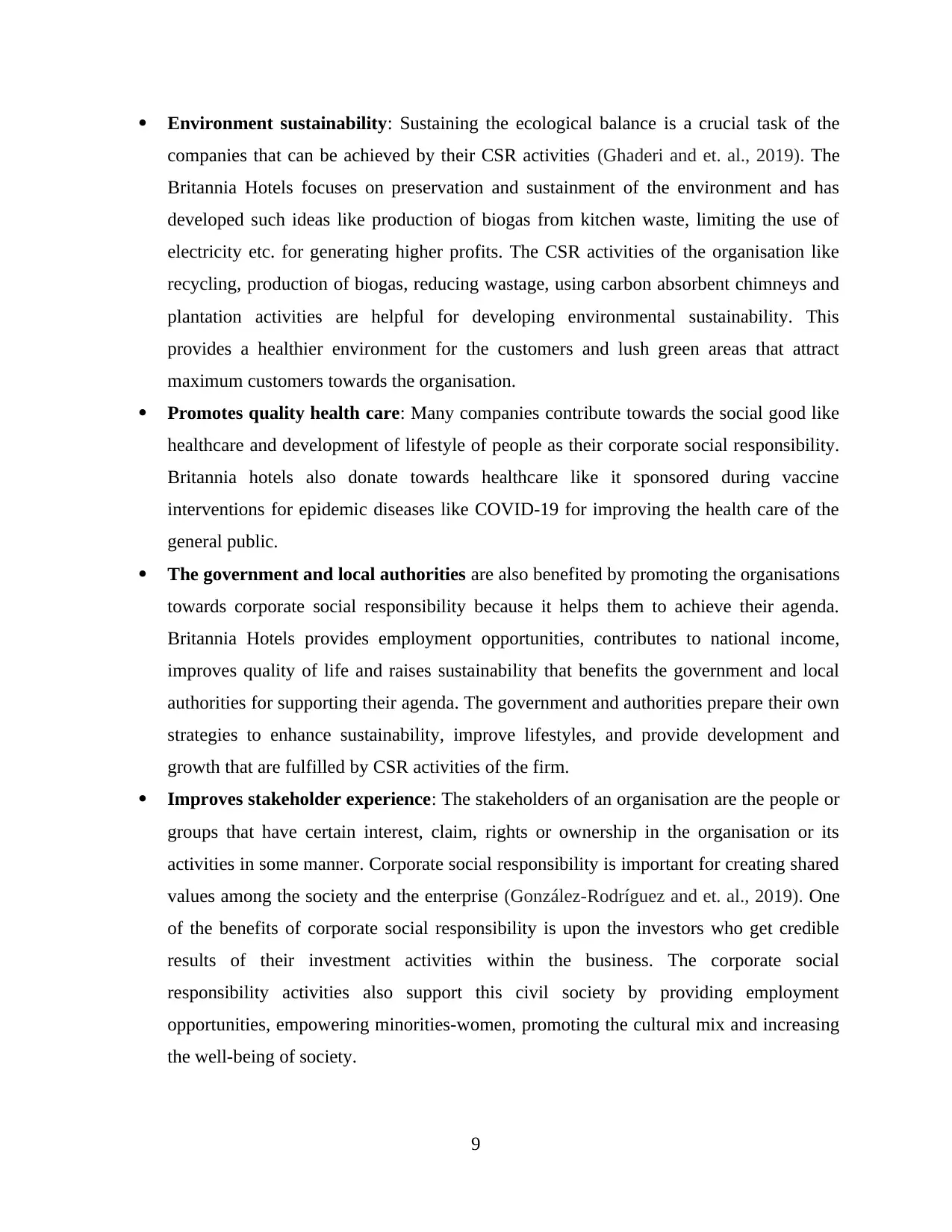
Environment sustainability: Sustaining the ecological balance is a crucial task of the
companies that can be achieved by their CSR activities (Ghaderi and et. al., 2019). The
Britannia Hotels focuses on preservation and sustainment of the environment and has
developed such ideas like production of biogas from kitchen waste, limiting the use of
electricity etc. for generating higher profits. The CSR activities of the organisation like
recycling, production of biogas, reducing wastage, using carbon absorbent chimneys and
plantation activities are helpful for developing environmental sustainability. This
provides a healthier environment for the customers and lush green areas that attract
maximum customers towards the organisation.
Promotes quality health care: Many companies contribute towards the social good like
healthcare and development of lifestyle of people as their corporate social responsibility.
Britannia hotels also donate towards healthcare like it sponsored during vaccine
interventions for epidemic diseases like COVID-19 for improving the health care of the
general public.
The government and local authorities are also benefited by promoting the organisations
towards corporate social responsibility because it helps them to achieve their agenda.
Britannia Hotels provides employment opportunities, contributes to national income,
improves quality of life and raises sustainability that benefits the government and local
authorities for supporting their agenda. The government and authorities prepare their own
strategies to enhance sustainability, improve lifestyles, and provide development and
growth that are fulfilled by CSR activities of the firm.
Improves stakeholder experience: The stakeholders of an organisation are the people or
groups that have certain interest, claim, rights or ownership in the organisation or its
activities in some manner. Corporate social responsibility is important for creating shared
values among the society and the enterprise (González-Rodríguez and et. al., 2019). One
of the benefits of corporate social responsibility is upon the investors who get credible
results of their investment activities within the business. The corporate social
responsibility activities also support this civil society by providing employment
opportunities, empowering minorities-women, promoting the cultural mix and increasing
the well-being of society.
9
companies that can be achieved by their CSR activities (Ghaderi and et. al., 2019). The
Britannia Hotels focuses on preservation and sustainment of the environment and has
developed such ideas like production of biogas from kitchen waste, limiting the use of
electricity etc. for generating higher profits. The CSR activities of the organisation like
recycling, production of biogas, reducing wastage, using carbon absorbent chimneys and
plantation activities are helpful for developing environmental sustainability. This
provides a healthier environment for the customers and lush green areas that attract
maximum customers towards the organisation.
Promotes quality health care: Many companies contribute towards the social good like
healthcare and development of lifestyle of people as their corporate social responsibility.
Britannia hotels also donate towards healthcare like it sponsored during vaccine
interventions for epidemic diseases like COVID-19 for improving the health care of the
general public.
The government and local authorities are also benefited by promoting the organisations
towards corporate social responsibility because it helps them to achieve their agenda.
Britannia Hotels provides employment opportunities, contributes to national income,
improves quality of life and raises sustainability that benefits the government and local
authorities for supporting their agenda. The government and authorities prepare their own
strategies to enhance sustainability, improve lifestyles, and provide development and
growth that are fulfilled by CSR activities of the firm.
Improves stakeholder experience: The stakeholders of an organisation are the people or
groups that have certain interest, claim, rights or ownership in the organisation or its
activities in some manner. Corporate social responsibility is important for creating shared
values among the society and the enterprise (González-Rodríguez and et. al., 2019). One
of the benefits of corporate social responsibility is upon the investors who get credible
results of their investment activities within the business. The corporate social
responsibility activities also support this civil society by providing employment
opportunities, empowering minorities-women, promoting the cultural mix and increasing
the well-being of society.
9
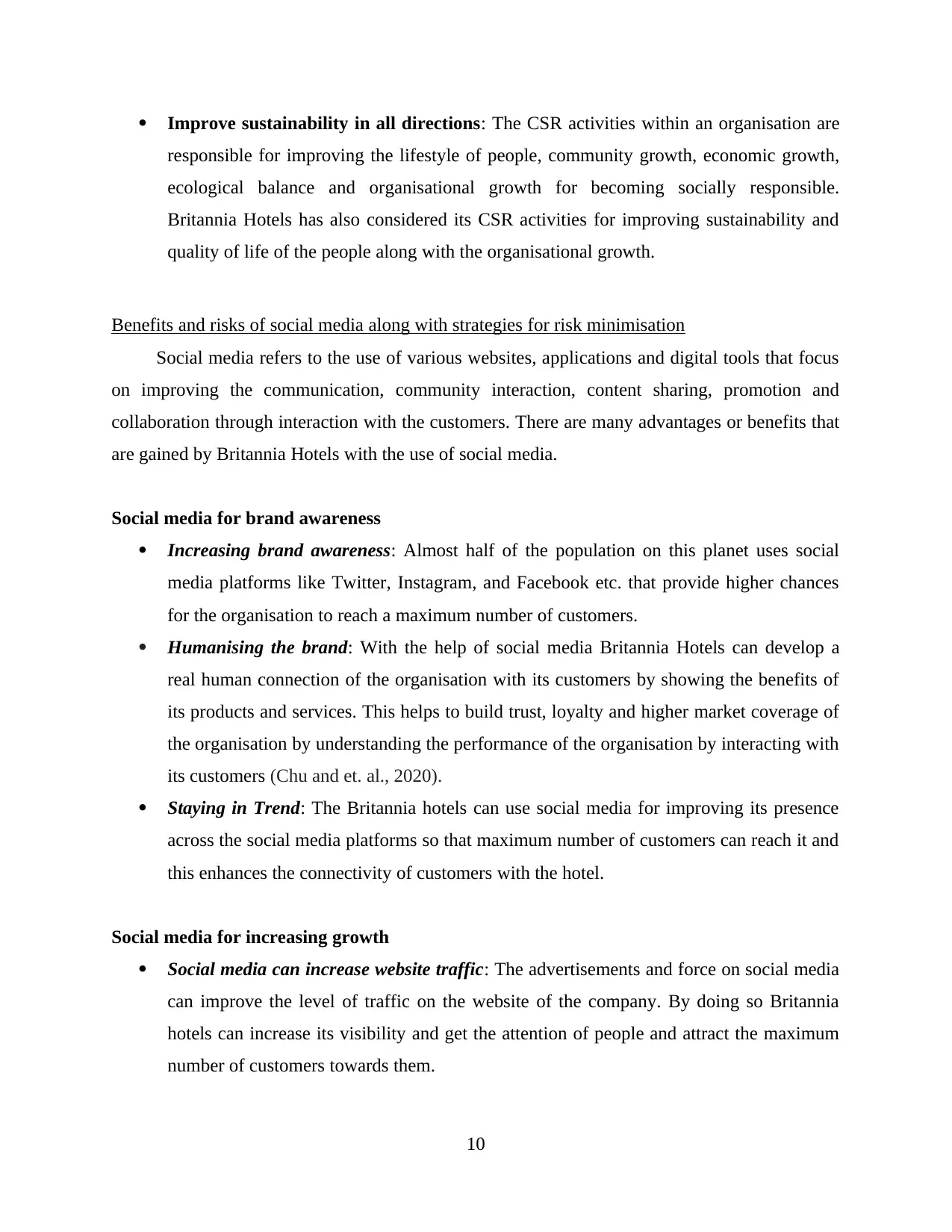
Improve sustainability in all directions: The CSR activities within an organisation are
responsible for improving the lifestyle of people, community growth, economic growth,
ecological balance and organisational growth for becoming socially responsible.
Britannia Hotels has also considered its CSR activities for improving sustainability and
quality of life of the people along with the organisational growth.
Benefits and risks of social media along with strategies for risk minimisation
Social media refers to the use of various websites, applications and digital tools that focus
on improving the communication, community interaction, content sharing, promotion and
collaboration through interaction with the customers. There are many advantages or benefits that
are gained by Britannia Hotels with the use of social media.
Social media for brand awareness
Increasing brand awareness: Almost half of the population on this planet uses social
media platforms like Twitter, Instagram, and Facebook etc. that provide higher chances
for the organisation to reach a maximum number of customers.
Humanising the brand: With the help of social media Britannia Hotels can develop a
real human connection of the organisation with its customers by showing the benefits of
its products and services. This helps to build trust, loyalty and higher market coverage of
the organisation by understanding the performance of the organisation by interacting with
its customers (Chu and et. al., 2020).
Staying in Trend: The Britannia hotels can use social media for improving its presence
across the social media platforms so that maximum number of customers can reach it and
this enhances the connectivity of customers with the hotel.
Social media for increasing growth
Social media can increase website traffic: The advertisements and force on social media
can improve the level of traffic on the website of the company. By doing so Britannia
hotels can increase its visibility and get the attention of people and attract the maximum
number of customers towards them.
10
responsible for improving the lifestyle of people, community growth, economic growth,
ecological balance and organisational growth for becoming socially responsible.
Britannia Hotels has also considered its CSR activities for improving sustainability and
quality of life of the people along with the organisational growth.
Benefits and risks of social media along with strategies for risk minimisation
Social media refers to the use of various websites, applications and digital tools that focus
on improving the communication, community interaction, content sharing, promotion and
collaboration through interaction with the customers. There are many advantages or benefits that
are gained by Britannia Hotels with the use of social media.
Social media for brand awareness
Increasing brand awareness: Almost half of the population on this planet uses social
media platforms like Twitter, Instagram, and Facebook etc. that provide higher chances
for the organisation to reach a maximum number of customers.
Humanising the brand: With the help of social media Britannia Hotels can develop a
real human connection of the organisation with its customers by showing the benefits of
its products and services. This helps to build trust, loyalty and higher market coverage of
the organisation by understanding the performance of the organisation by interacting with
its customers (Chu and et. al., 2020).
Staying in Trend: The Britannia hotels can use social media for improving its presence
across the social media platforms so that maximum number of customers can reach it and
this enhances the connectivity of customers with the hotel.
Social media for increasing growth
Social media can increase website traffic: The advertisements and force on social media
can improve the level of traffic on the website of the company. By doing so Britannia
hotels can increase its visibility and get the attention of people and attract the maximum
number of customers towards them.
10
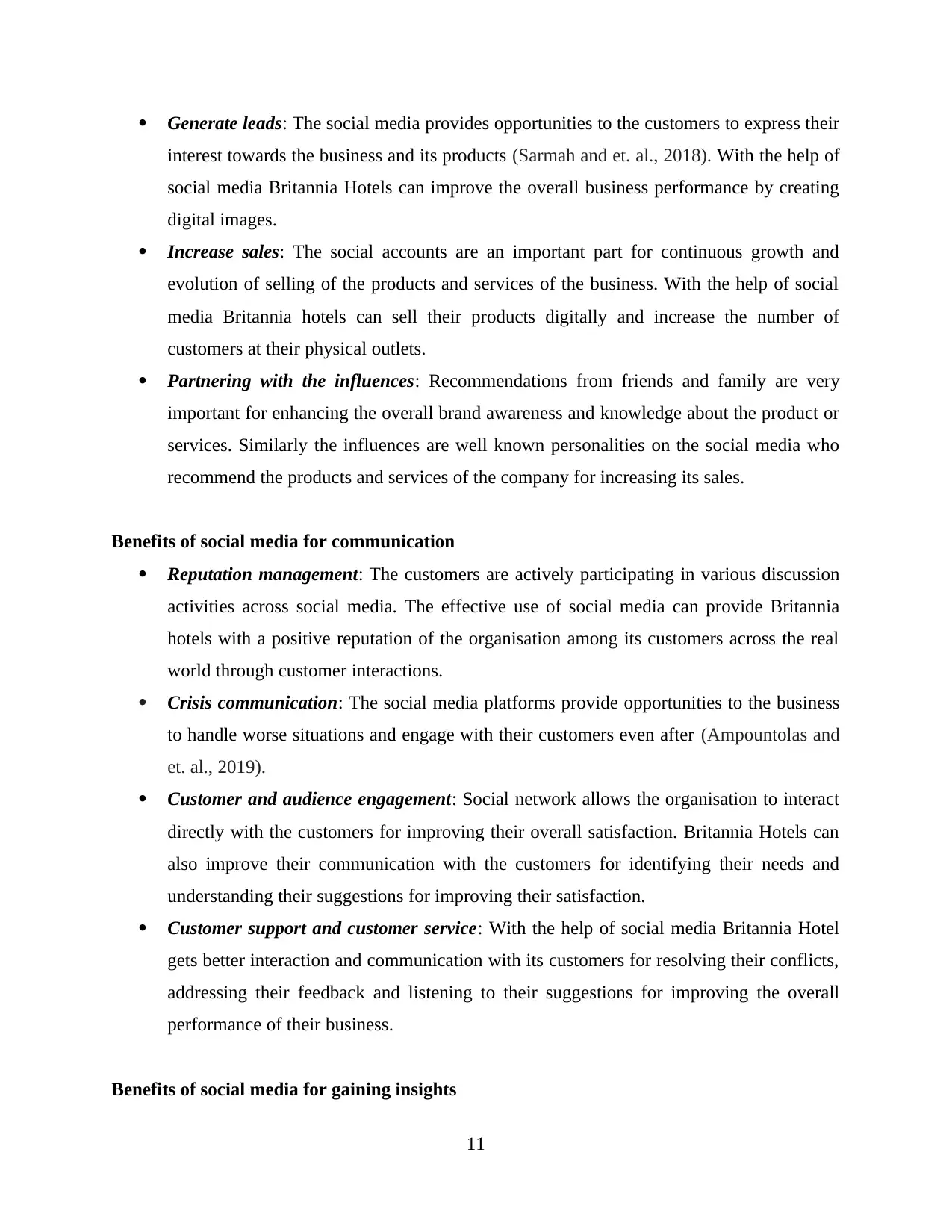
Generate leads: The social media provides opportunities to the customers to express their
interest towards the business and its products (Sarmah and et. al., 2018). With the help of
social media Britannia Hotels can improve the overall business performance by creating
digital images.
Increase sales: The social accounts are an important part for continuous growth and
evolution of selling of the products and services of the business. With the help of social
media Britannia hotels can sell their products digitally and increase the number of
customers at their physical outlets.
Partnering with the influences: Recommendations from friends and family are very
important for enhancing the overall brand awareness and knowledge about the product or
services. Similarly the influences are well known personalities on the social media who
recommend the products and services of the company for increasing its sales.
Benefits of social media for communication
Reputation management: The customers are actively participating in various discussion
activities across social media. The effective use of social media can provide Britannia
hotels with a positive reputation of the organisation among its customers across the real
world through customer interactions.
Crisis communication: The social media platforms provide opportunities to the business
to handle worse situations and engage with their customers even after (Ampountolas and
et. al., 2019).
Customer and audience engagement: Social network allows the organisation to interact
directly with the customers for improving their overall satisfaction. Britannia Hotels can
also improve their communication with the customers for identifying their needs and
understanding their suggestions for improving their satisfaction.
Customer support and customer service: With the help of social media Britannia Hotel
gets better interaction and communication with its customers for resolving their conflicts,
addressing their feedback and listening to their suggestions for improving the overall
performance of their business.
Benefits of social media for gaining insights
11
interest towards the business and its products (Sarmah and et. al., 2018). With the help of
social media Britannia Hotels can improve the overall business performance by creating
digital images.
Increase sales: The social accounts are an important part for continuous growth and
evolution of selling of the products and services of the business. With the help of social
media Britannia hotels can sell their products digitally and increase the number of
customers at their physical outlets.
Partnering with the influences: Recommendations from friends and family are very
important for enhancing the overall brand awareness and knowledge about the product or
services. Similarly the influences are well known personalities on the social media who
recommend the products and services of the company for increasing its sales.
Benefits of social media for communication
Reputation management: The customers are actively participating in various discussion
activities across social media. The effective use of social media can provide Britannia
hotels with a positive reputation of the organisation among its customers across the real
world through customer interactions.
Crisis communication: The social media platforms provide opportunities to the business
to handle worse situations and engage with their customers even after (Ampountolas and
et. al., 2019).
Customer and audience engagement: Social network allows the organisation to interact
directly with the customers for improving their overall satisfaction. Britannia Hotels can
also improve their communication with the customers for identifying their needs and
understanding their suggestions for improving their satisfaction.
Customer support and customer service: With the help of social media Britannia Hotel
gets better interaction and communication with its customers for resolving their conflicts,
addressing their feedback and listening to their suggestions for improving the overall
performance of their business.
Benefits of social media for gaining insights
11
Paraphrase This Document
Need a fresh take? Get an instant paraphrase of this document with our AI Paraphraser
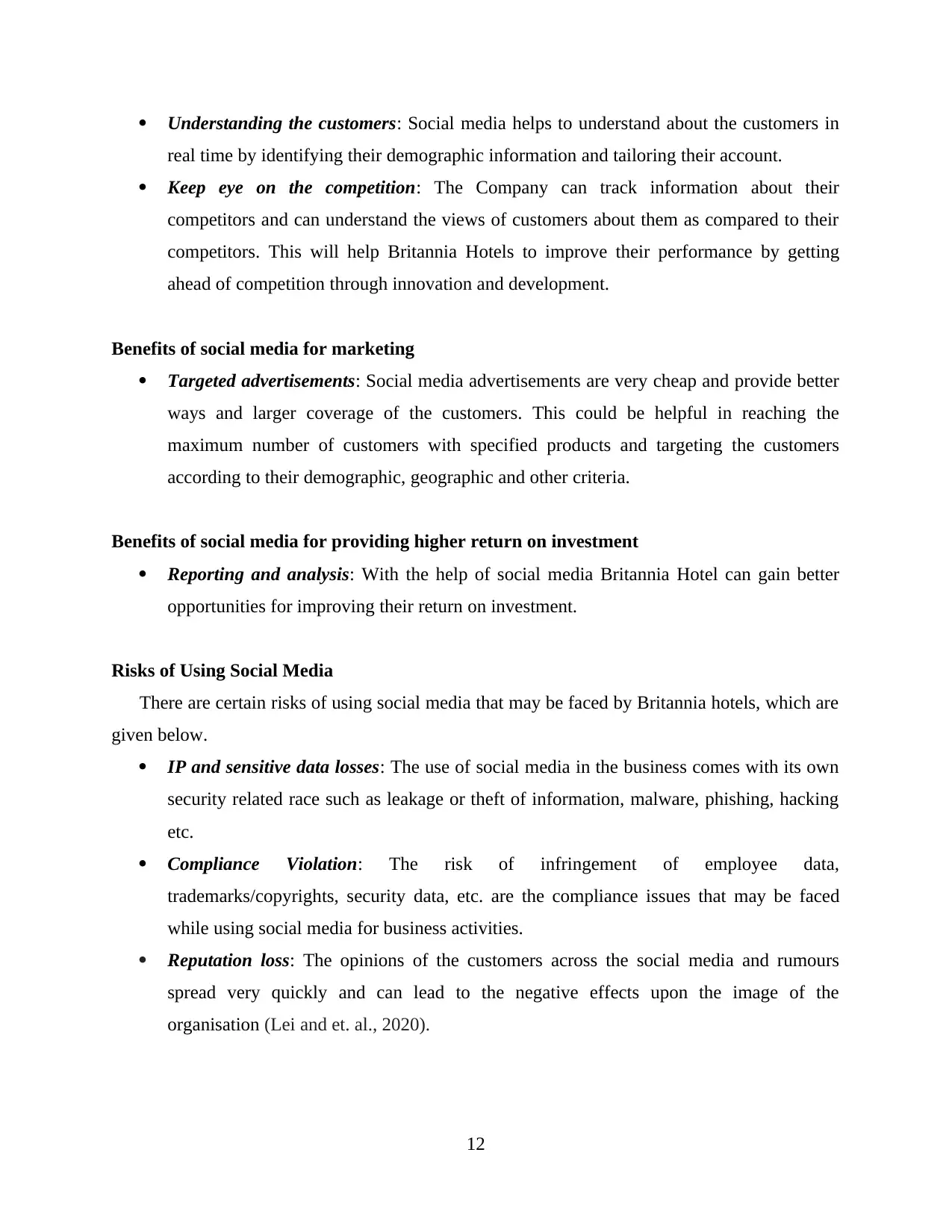
Understanding the customers: Social media helps to understand about the customers in
real time by identifying their demographic information and tailoring their account.
Keep eye on the competition: The Company can track information about their
competitors and can understand the views of customers about them as compared to their
competitors. This will help Britannia Hotels to improve their performance by getting
ahead of competition through innovation and development.
Benefits of social media for marketing
Targeted advertisements: Social media advertisements are very cheap and provide better
ways and larger coverage of the customers. This could be helpful in reaching the
maximum number of customers with specified products and targeting the customers
according to their demographic, geographic and other criteria.
Benefits of social media for providing higher return on investment
Reporting and analysis: With the help of social media Britannia Hotel can gain better
opportunities for improving their return on investment.
Risks of Using Social Media
There are certain risks of using social media that may be faced by Britannia hotels, which are
given below.
IP and sensitive data losses: The use of social media in the business comes with its own
security related race such as leakage or theft of information, malware, phishing, hacking
etc.
Compliance Violation: The risk of infringement of employee data,
trademarks/copyrights, security data, etc. are the compliance issues that may be faced
while using social media for business activities.
Reputation loss: The opinions of the customers across the social media and rumours
spread very quickly and can lead to the negative effects upon the image of the
organisation (Lei and et. al., 2020).
12
real time by identifying their demographic information and tailoring their account.
Keep eye on the competition: The Company can track information about their
competitors and can understand the views of customers about them as compared to their
competitors. This will help Britannia Hotels to improve their performance by getting
ahead of competition through innovation and development.
Benefits of social media for marketing
Targeted advertisements: Social media advertisements are very cheap and provide better
ways and larger coverage of the customers. This could be helpful in reaching the
maximum number of customers with specified products and targeting the customers
according to their demographic, geographic and other criteria.
Benefits of social media for providing higher return on investment
Reporting and analysis: With the help of social media Britannia Hotel can gain better
opportunities for improving their return on investment.
Risks of Using Social Media
There are certain risks of using social media that may be faced by Britannia hotels, which are
given below.
IP and sensitive data losses: The use of social media in the business comes with its own
security related race such as leakage or theft of information, malware, phishing, hacking
etc.
Compliance Violation: The risk of infringement of employee data,
trademarks/copyrights, security data, etc. are the compliance issues that may be faced
while using social media for business activities.
Reputation loss: The opinions of the customers across the social media and rumours
spread very quickly and can lead to the negative effects upon the image of the
organisation (Lei and et. al., 2020).
12
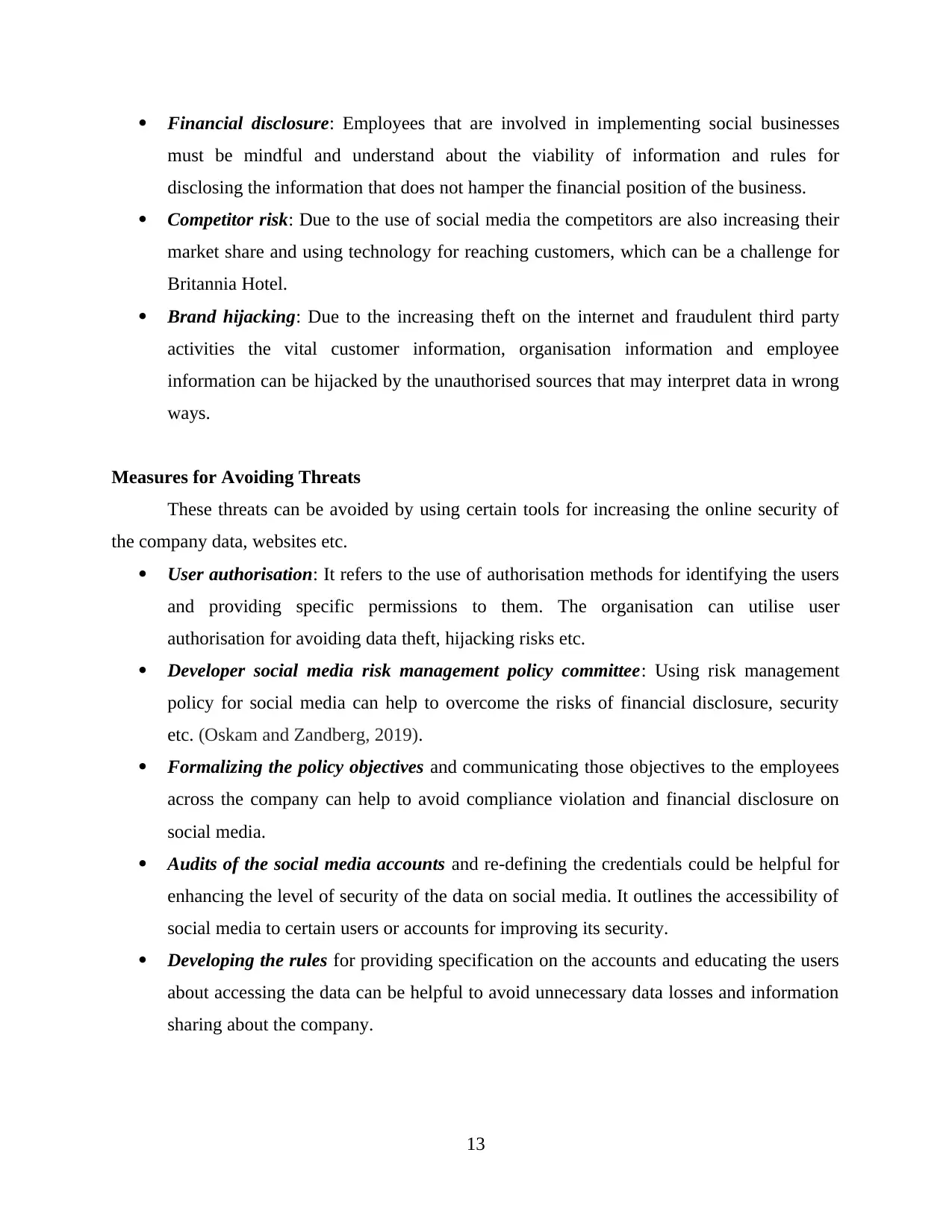
Financial disclosure: Employees that are involved in implementing social businesses
must be mindful and understand about the viability of information and rules for
disclosing the information that does not hamper the financial position of the business.
Competitor risk: Due to the use of social media the competitors are also increasing their
market share and using technology for reaching customers, which can be a challenge for
Britannia Hotel.
Brand hijacking: Due to the increasing theft on the internet and fraudulent third party
activities the vital customer information, organisation information and employee
information can be hijacked by the unauthorised sources that may interpret data in wrong
ways.
Measures for Avoiding Threats
These threats can be avoided by using certain tools for increasing the online security of
the company data, websites etc.
User authorisation: It refers to the use of authorisation methods for identifying the users
and providing specific permissions to them. The organisation can utilise user
authorisation for avoiding data theft, hijacking risks etc.
Developer social media risk management policy committee: Using risk management
policy for social media can help to overcome the risks of financial disclosure, security
etc. (Oskam and Zandberg, 2019).
Formalizing the policy objectives and communicating those objectives to the employees
across the company can help to avoid compliance violation and financial disclosure on
social media.
Audits of the social media accounts and re-defining the credentials could be helpful for
enhancing the level of security of the data on social media. It outlines the accessibility of
social media to certain users or accounts for improving its security.
Developing the rules for providing specification on the accounts and educating the users
about accessing the data can be helpful to avoid unnecessary data losses and information
sharing about the company.
13
must be mindful and understand about the viability of information and rules for
disclosing the information that does not hamper the financial position of the business.
Competitor risk: Due to the use of social media the competitors are also increasing their
market share and using technology for reaching customers, which can be a challenge for
Britannia Hotel.
Brand hijacking: Due to the increasing theft on the internet and fraudulent third party
activities the vital customer information, organisation information and employee
information can be hijacked by the unauthorised sources that may interpret data in wrong
ways.
Measures for Avoiding Threats
These threats can be avoided by using certain tools for increasing the online security of
the company data, websites etc.
User authorisation: It refers to the use of authorisation methods for identifying the users
and providing specific permissions to them. The organisation can utilise user
authorisation for avoiding data theft, hijacking risks etc.
Developer social media risk management policy committee: Using risk management
policy for social media can help to overcome the risks of financial disclosure, security
etc. (Oskam and Zandberg, 2019).
Formalizing the policy objectives and communicating those objectives to the employees
across the company can help to avoid compliance violation and financial disclosure on
social media.
Audits of the social media accounts and re-defining the credentials could be helpful for
enhancing the level of security of the data on social media. It outlines the accessibility of
social media to certain users or accounts for improving its security.
Developing the rules for providing specification on the accounts and educating the users
about accessing the data can be helpful to avoid unnecessary data losses and information
sharing about the company.
13
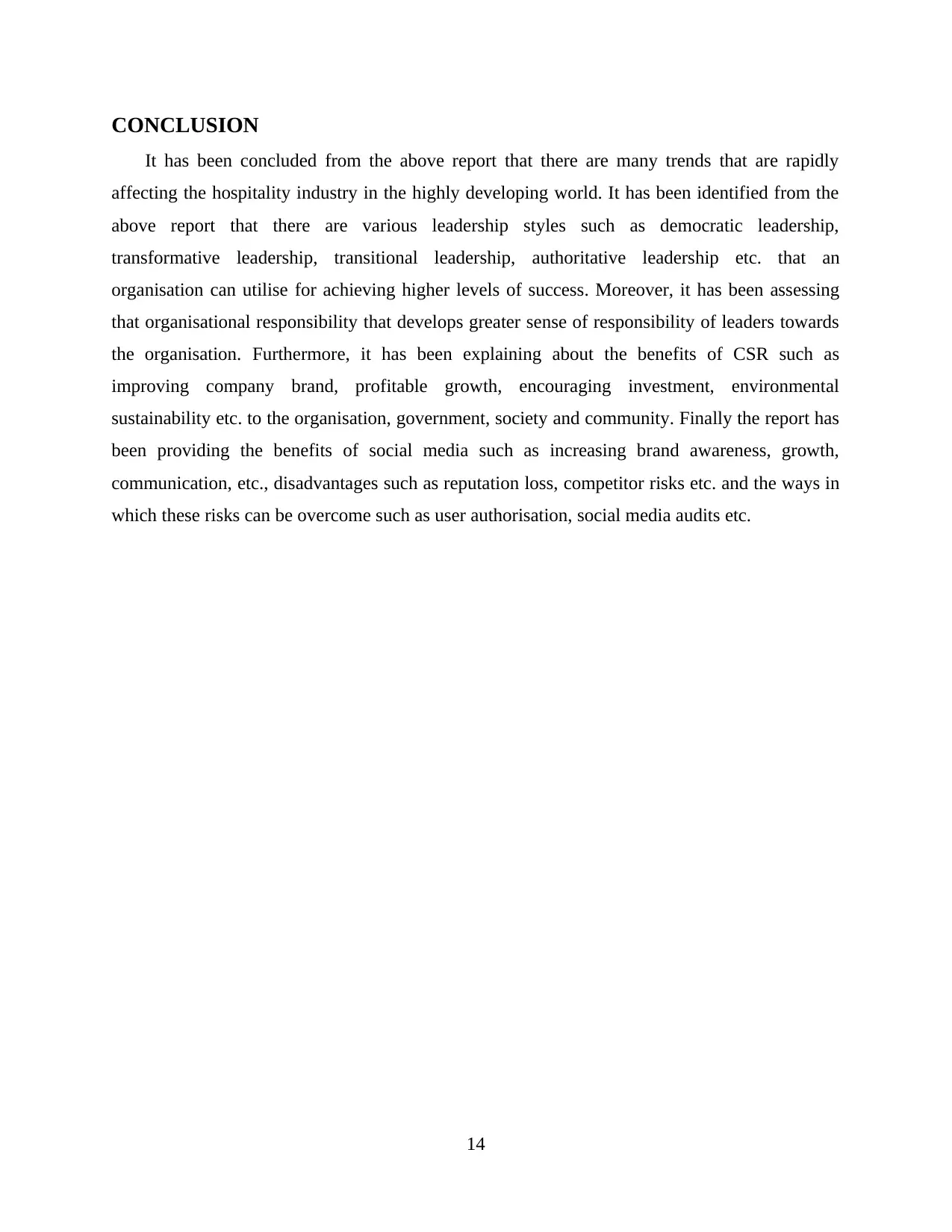
CONCLUSION
It has been concluded from the above report that there are many trends that are rapidly
affecting the hospitality industry in the highly developing world. It has been identified from the
above report that there are various leadership styles such as democratic leadership,
transformative leadership, transitional leadership, authoritative leadership etc. that an
organisation can utilise for achieving higher levels of success. Moreover, it has been assessing
that organisational responsibility that develops greater sense of responsibility of leaders towards
the organisation. Furthermore, it has been explaining about the benefits of CSR such as
improving company brand, profitable growth, encouraging investment, environmental
sustainability etc. to the organisation, government, society and community. Finally the report has
been providing the benefits of social media such as increasing brand awareness, growth,
communication, etc., disadvantages such as reputation loss, competitor risks etc. and the ways in
which these risks can be overcome such as user authorisation, social media audits etc.
14
It has been concluded from the above report that there are many trends that are rapidly
affecting the hospitality industry in the highly developing world. It has been identified from the
above report that there are various leadership styles such as democratic leadership,
transformative leadership, transitional leadership, authoritative leadership etc. that an
organisation can utilise for achieving higher levels of success. Moreover, it has been assessing
that organisational responsibility that develops greater sense of responsibility of leaders towards
the organisation. Furthermore, it has been explaining about the benefits of CSR such as
improving company brand, profitable growth, encouraging investment, environmental
sustainability etc. to the organisation, government, society and community. Finally the report has
been providing the benefits of social media such as increasing brand awareness, growth,
communication, etc., disadvantages such as reputation loss, competitor risks etc. and the ways in
which these risks can be overcome such as user authorisation, social media audits etc.
14
Secure Best Marks with AI Grader
Need help grading? Try our AI Grader for instant feedback on your assignments.
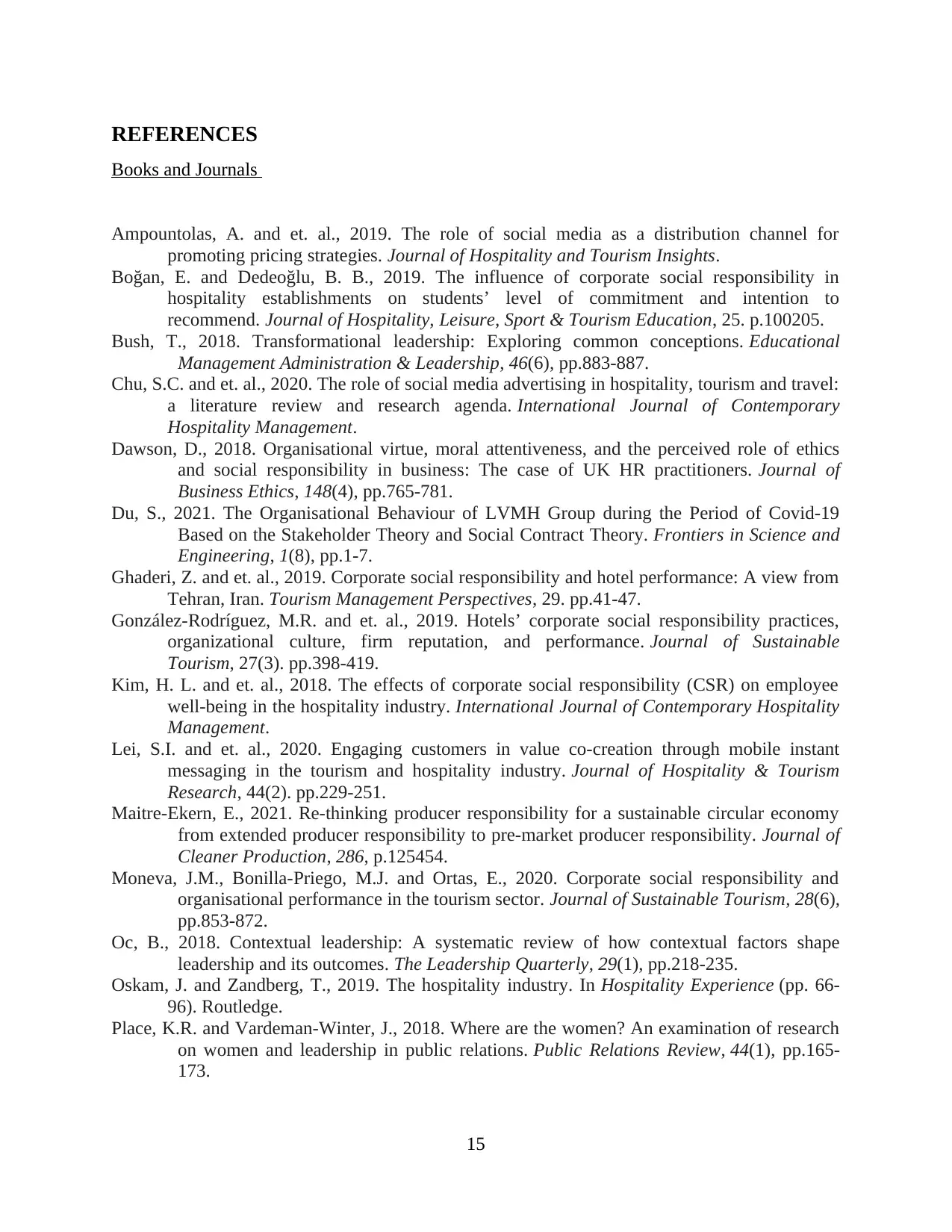
REFERENCES
Books and Journals
Ampountolas, A. and et. al., 2019. The role of social media as a distribution channel for
promoting pricing strategies. Journal of Hospitality and Tourism Insights.
Boğan, E. and Dedeoğlu, B. B., 2019. The influence of corporate social responsibility in
hospitality establishments on students’ level of commitment and intention to
recommend. Journal of Hospitality, Leisure, Sport & Tourism Education, 25. p.100205.
Bush, T., 2018. Transformational leadership: Exploring common conceptions. Educational
Management Administration & Leadership, 46(6), pp.883-887.
Chu, S.C. and et. al., 2020. The role of social media advertising in hospitality, tourism and travel:
a literature review and research agenda. International Journal of Contemporary
Hospitality Management.
Dawson, D., 2018. Organisational virtue, moral attentiveness, and the perceived role of ethics
and social responsibility in business: The case of UK HR practitioners. Journal of
Business Ethics, 148(4), pp.765-781.
Du, S., 2021. The Organisational Behaviour of LVMH Group during the Period of Covid‐19
Based on the Stakeholder Theory and Social Contract Theory. Frontiers in Science and
Engineering, 1(8), pp.1-7.
Ghaderi, Z. and et. al., 2019. Corporate social responsibility and hotel performance: A view from
Tehran, Iran. Tourism Management Perspectives, 29. pp.41-47.
González-Rodríguez, M.R. and et. al., 2019. Hotels’ corporate social responsibility practices,
organizational culture, firm reputation, and performance. Journal of Sustainable
Tourism, 27(3). pp.398-419.
Kim, H. L. and et. al., 2018. The effects of corporate social responsibility (CSR) on employee
well-being in the hospitality industry. International Journal of Contemporary Hospitality
Management.
Lei, S.I. and et. al., 2020. Engaging customers in value co-creation through mobile instant
messaging in the tourism and hospitality industry. Journal of Hospitality & Tourism
Research, 44(2). pp.229-251.
Maitre-Ekern, E., 2021. Re-thinking producer responsibility for a sustainable circular economy
from extended producer responsibility to pre-market producer responsibility. Journal of
Cleaner Production, 286, p.125454.
Moneva, J.M., Bonilla-Priego, M.J. and Ortas, E., 2020. Corporate social responsibility and
organisational performance in the tourism sector. Journal of Sustainable Tourism, 28(6),
pp.853-872.
Oc, B., 2018. Contextual leadership: A systematic review of how contextual factors shape
leadership and its outcomes. The Leadership Quarterly, 29(1), pp.218-235.
Oskam, J. and Zandberg, T., 2019. The hospitality industry. In Hospitality Experience (pp. 66-
96). Routledge.
Place, K.R. and Vardeman-Winter, J., 2018. Where are the women? An examination of research
on women and leadership in public relations. Public Relations Review, 44(1), pp.165-
173.
15
Books and Journals
Ampountolas, A. and et. al., 2019. The role of social media as a distribution channel for
promoting pricing strategies. Journal of Hospitality and Tourism Insights.
Boğan, E. and Dedeoğlu, B. B., 2019. The influence of corporate social responsibility in
hospitality establishments on students’ level of commitment and intention to
recommend. Journal of Hospitality, Leisure, Sport & Tourism Education, 25. p.100205.
Bush, T., 2018. Transformational leadership: Exploring common conceptions. Educational
Management Administration & Leadership, 46(6), pp.883-887.
Chu, S.C. and et. al., 2020. The role of social media advertising in hospitality, tourism and travel:
a literature review and research agenda. International Journal of Contemporary
Hospitality Management.
Dawson, D., 2018. Organisational virtue, moral attentiveness, and the perceived role of ethics
and social responsibility in business: The case of UK HR practitioners. Journal of
Business Ethics, 148(4), pp.765-781.
Du, S., 2021. The Organisational Behaviour of LVMH Group during the Period of Covid‐19
Based on the Stakeholder Theory and Social Contract Theory. Frontiers in Science and
Engineering, 1(8), pp.1-7.
Ghaderi, Z. and et. al., 2019. Corporate social responsibility and hotel performance: A view from
Tehran, Iran. Tourism Management Perspectives, 29. pp.41-47.
González-Rodríguez, M.R. and et. al., 2019. Hotels’ corporate social responsibility practices,
organizational culture, firm reputation, and performance. Journal of Sustainable
Tourism, 27(3). pp.398-419.
Kim, H. L. and et. al., 2018. The effects of corporate social responsibility (CSR) on employee
well-being in the hospitality industry. International Journal of Contemporary Hospitality
Management.
Lei, S.I. and et. al., 2020. Engaging customers in value co-creation through mobile instant
messaging in the tourism and hospitality industry. Journal of Hospitality & Tourism
Research, 44(2). pp.229-251.
Maitre-Ekern, E., 2021. Re-thinking producer responsibility for a sustainable circular economy
from extended producer responsibility to pre-market producer responsibility. Journal of
Cleaner Production, 286, p.125454.
Moneva, J.M., Bonilla-Priego, M.J. and Ortas, E., 2020. Corporate social responsibility and
organisational performance in the tourism sector. Journal of Sustainable Tourism, 28(6),
pp.853-872.
Oc, B., 2018. Contextual leadership: A systematic review of how contextual factors shape
leadership and its outcomes. The Leadership Quarterly, 29(1), pp.218-235.
Oskam, J. and Zandberg, T., 2019. The hospitality industry. In Hospitality Experience (pp. 66-
96). Routledge.
Place, K.R. and Vardeman-Winter, J., 2018. Where are the women? An examination of research
on women and leadership in public relations. Public Relations Review, 44(1), pp.165-
173.
15
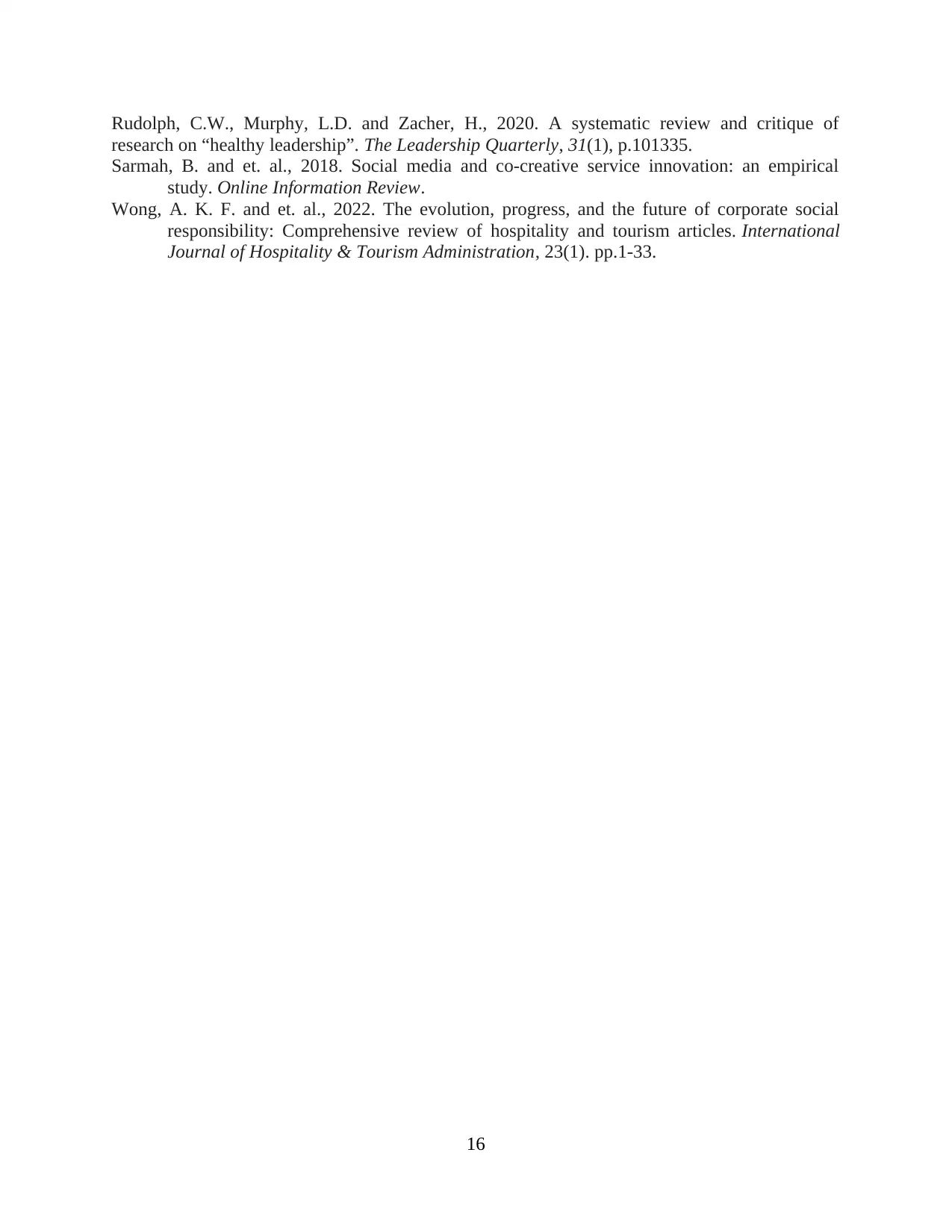
Rudolph, C.W., Murphy, L.D. and Zacher, H., 2020. A systematic review and critique of
research on “healthy leadership”. The Leadership Quarterly, 31(1), p.101335.
Sarmah, B. and et. al., 2018. Social media and co-creative service innovation: an empirical
study. Online Information Review.
Wong, A. K. F. and et. al., 2022. The evolution, progress, and the future of corporate social
responsibility: Comprehensive review of hospitality and tourism articles. International
Journal of Hospitality & Tourism Administration, 23(1). pp.1-33.
16
research on “healthy leadership”. The Leadership Quarterly, 31(1), p.101335.
Sarmah, B. and et. al., 2018. Social media and co-creative service innovation: an empirical
study. Online Information Review.
Wong, A. K. F. and et. al., 2022. The evolution, progress, and the future of corporate social
responsibility: Comprehensive review of hospitality and tourism articles. International
Journal of Hospitality & Tourism Administration, 23(1). pp.1-33.
16
1 out of 18
Related Documents
Your All-in-One AI-Powered Toolkit for Academic Success.
+13062052269
info@desklib.com
Available 24*7 on WhatsApp / Email
![[object Object]](/_next/static/media/star-bottom.7253800d.svg)
Unlock your academic potential
© 2024 | Zucol Services PVT LTD | All rights reserved.



